#but you should also know that it's just bad storytelling
Text
So as a good NB bisexual trad wife married to a Jewish trans person I was in church this morning trying my hardest not to fall asleep on the good lord's shittiest seating arrangement, as is custom.
Cutting right to it, the sermon was weird.
What I listened to was a French translation of a text by one Gary Heinz, whom I've been told is a Canadian pastor but the only one I could find online is from the Carolinas, with a degree from Charleston, so for the purpose of this post I'll just say he's American in the same vague way as his tomato-based namesake.
The sermon was talking about the tale of the good Samaritan, which most people know about, and was composed thuszthly.
First it goes over the tale again, then it helps define the elements of it and how they're relevant to the point made by our boy Jesus. The priest sees a naked beat-up man on the side of the rode, presumably from a mount, and decides not to get involved even though if he had any way to know the man had been Jewish he would have been bound to help him. The second man is a Levite, traditionally someone who helps priests and knows the law just as well, but decides not to get involved either. The third guy of course is a Samaritan. The Samaritans are a distinct but very closely related ethnoreligious group to the Hebrews/Jews, who we are often told hate them.
The Samaritan helps the person, provides first aid, props him up on his horse and walks him to an inn where he houses him by giving the innkeeper two pieces of silver and promising to pay any extra cost on his next trip back. This according to the preacher is a symbol of limitless charity, we'll get back to that.
The context of the tale was a smartass asking Jesus what to do to be saved and when being told to do unto thy neighbor as you would doeth unto thineselfe (in Middle English, which was very confusing at the time), follows up by asking who his neighbor was, aka who he should apply the law to. The point being made is that although the law could be read and almost bent into only applying to people you care about, only people you're explicitly meant to treat well and even then only once you're absolutely sure they're marked as such, it's more important to follow the spirit of the law which is to be kind to everyone. Which is a good message.
So why am I kvetching ?
That was only the first part of the sermon, and if you thought the second part would be about linking that message to current event you'd unfortunately be wrong. It's instead focused on finding, or making up really, symbolism in the story that foretells the passion of Jesus. You see the Samaritan was really a stand-in for anyone you might hate, including, and I quote, "a Nazi or a member of ISIS", because even they can be saved and be your neighbor for the purpose of doing unto them like unto thyself. And the two silver coins well you see they would pay for two nights and on the third one Jesus comes back from the dead.
Now I'm not an expert on the cost of living in Ancient Judea.
But Gary Heinz isn't either so I'm gonna say it, he pulled that number out of his ass. Also a little confused about the same storytelling element being earlier compared to limitless charity, only now to be quantified as worth two nights at a B&B.
But that's just nitpicking, what I'm really tired of is every reading of the holy texts [cut to meme] by Christian preachers devolving into improv rapping about Jesus and how he died for us. The lessons in the Bible stop being broadly applicable to daily life and are instead contrived into fifty different ways to say "he is risen" like it's isn't the sole fucking reason we're in church to begin with. That's usually bad enough, but when a pastor says that the Samaritan in the tale of the good Samaritan was here for shock value and could be "a Nazi or a member of ISIS", this changes the meaning of the tale to "be kind to everyone regardless of who they are, including Nazis apparently", from the original condemnation of prejudices. The Samaritan didn't chose to be a Samaritan, he's not doing any harm being a Samaritan, and the tale shows that his religion being slightly removed from orthodox Judaism isn't as important as his doing good and helping his fellow man. I don't think someone who joined a political party predicated on the extermination of minorities would fit that message, and I think changing said message to a more broad declaration of love from Jesus is ignoring what people need to hear these days where prejudice against minorities makes up 90% of the news.
And you might say it's not really a preacher's job to raise awareness for current events, but I'll ask you this: is hearing about how Jesus totally died for you every week supposed to make me a better Christian ? Or is learning that he told us pretty much in clear text not to hate minorities based on prejudice gonna do that.
Cause I think most Christians need to hear the later more.
79 notes
·
View notes
Text
Harry Potter & shallow worldbuilding
I probably shouldn't wade into these waters, but once again, I am demonstrating that my self-preservation instincts are poor, and that my family refuse to listen to my rants anymore. [TW: Harry Potter and all that entails].
I was a little confused when I saw the trailer for Hogwarts Legacy (source of ire for me, and many many other people). I had thought that it was supposed to be set in Victorian England, but honestly, it looked a lot like it was still set in the 1990s (or the early 2000s, the films never came down on exact dates). Perhaps this is because the movies - upon which all subsequent media has based its design - relied heavily on Victorian and early 20th century design elements. Think Hogwarts' gothic architecture; the ministry's early London Underground tiles; and the entire interior of Grimmauld Place. This wasn't in any way a bad thing. Harry Potter, as a story, made good on a sense of whimsy and old British aesthetics. The wizarding world, having no need of technology, would not modernise its aesthetics at the same rate as the non-magical world. It was a design choice that was of great consternation to my mother. We went to see Harry Potter and the Cursed Child, she whispered to me 'why do they have wheelie suitcases? I thought this was set in the 1930s?'
It makes me wonder now, why doesn't the world in Hogwarts Legacy look much different to its predecessor? I suppose that they are wearing vaguely Victorian clothes, but shouldn't we be looking at some 1700s aesthetics, or is the wizarding world caught in a perpetual loop of Victoriana?
Truth is, the Harry Potter universe has fallen foul of the problem that irks most fantasy universes once they are analysed for too long. It isn't logically coherent. Like the history of Westeros, the history of the wizarding world repeats itself perpetually, never looking or behaving especially differently. In a series of children's books that were focused on the life of one teen, the cracks didn't show. Sure, Voldemort was in power twice, and before him there was Grindelwald (for all intents and purposes, Voldemort but European).
J.K. Rowling's world building is fine for what it was in the beginning (again, the life of one teen in Britain), or as fine as it could be. The world was not greatly expansive, but it didn't need to be. The best parts of it were whimsical and extensions of the cheerier side of Britain. There was the Knight bus, a purple routemaster. The entrance to the Ministry of Magic was inside a red phone box, one of the great symbols of British tourism. The primary setting was a boarding school. One of the most popular elements is the house system, which is just a more complicated extension of your average school house system. It is touted as a categorisation of identity, but it obeys all the rules of school houses. Siblings going into different houses is rare (to the point that it's only mentioned once) because family groups always go into the same house (unless your school just doesn't care about houses). The bigotry in the series is also British by design. It ends up being a simplified version of classism, that features more in subtext than text. This being said, there isn't a great deal of specificity in the world building. I still don't know where Hermione's home town is. I only know that her parents are dentists and they like to ski. Where does Malfoy live, apart from in a manor that has peacocks in the garden? These are the kind of flaws you notice when you have analysed the story for as long as I have.
The worldbuilding gets thinner the more expansive it gets. The students from Beauxbatons are more or less French stereotypes, Fleur especially. Durmstrang is the same, but Bulgarian. Much has already been said on Rowling's shallow naming conventions (Cho Chang, Kingsley Shacklebolt, and now Sirona Ryan). Without the crutch of something being British and vaguely quaint, the world loses all of its charm, and all of its logic.
Fantastic Beasts, for some reason, begins in 1920s New York. Most of the richness of the setting is achieved by production design rather than the script (incidentally, flashbacks set in Hogwarts still manage to look like it's the early 2000s). Conflict in the story is wrought from an American government that is more anti-muggle than the British equivalent. If it is allegorical in any way, I do not understand it. But let's not pretend Rowling's allegory has ever been any good. Claims that Lupin's lycanthropy was a metaphor for HIV and AIDs only serve to lessen the character. At best, it's an allegory for general prejudice. The assertion that Lupin, at the age of six, was attacked by Greyback with the express intention of passing on AIDs, is well, it's dicey. Rowling might have intended to create an allegory for stigma around 'blood-borne conditions', but failed to consider the extra baggage that that allegory might entail.
The same is true for Fantastic Beasts, where the nonsense is turned up to twenty. There's a group of muggles who somehow know about the existence of magic. They name themselves after Salem, despite the Salem witch trials being appropriate for neither this setting nor this geographic region. Any commentary on the nature of the Salem witch trials is hardly a commentary on the nature of America at large, but rather a commentary on a single Puritan colony. Rowling takes pieces of Native American culture for her lore, with no understanding of the cultural legacy at play.
It gets even weirder in the sequels, which zip through countries so fast there's barely any time for worldbuilding. There's a circus! Why! I don't know.
For no reason at all, there's a deer that chooses the outcome of an election. In a baffling moment, Grindelwald (as played by font of virtue, Johnny Depp) tells a group of wizards that they have to kill muggles because they are going to start a world war. He is wizarding Hitler, and that isn't a subtle analogy. In that same scene, Queenie Goldstein, a character heavily coded as Jewish, joins wizard Hitler because he promises her that she will be able to marry her muggle beau. The man that just gave a speech about killing muggles, is apparently all for marriage equality! By all means, it doesn't make any sense. It’s far from being respectful either.
There are of course attempts to make the wizarding world more diverse in Fantastic Beasts, but without any attempt to make these characters more genuine. There's an Asian woman, but she's Voldemort's snake and she's going to be beheaded by Neville in a few decades. The second film has Zoe Kravitz! Yay! But she's part of a needlessly convoluted tale in which a powerful white man hypnotises a black woman to be his wife, and then she dies? I don't know what to make of that. It's not good representation, and by gum it isn't good storytelling! The Fantastic Beasts trilogy has all the perspective of Emily in Paris.
Hogwarts Legacy can hardly improve upon this worldbuilding, because it comes from an unstable foundation. I might have been more understanding had the game been set in say, not Hogwarts, or even a Hogwarts that was fundamentally different from the Hogwarts that we already know. The worldbuilding remains as shallow as it ever was, and with all the bigotry retained. Of course, the main story is based on a piece of anti-semitic folklore, expanded upon in the books, and even more so in the game. The problem being that Hogwarts Legacy can only make sales based on nostalgia. It can't be that different from the world of the novels, because no one is bold enough to alter the world and alienate people who want nothing more than to experience their childhoods all over again. As such, the shallow worldbuilding is laid bare over and over again, to the point that it is no longer a setting in service of a series of novels. It now has to be a real, coherent world, which it fails at. We have to examine the nature of Hogwarts houses, and the mechanics of time turners (thank you Cursed Child), and the reasons why house elves don't want their freedom.
They'll never get freedom anyhow, because Hermione's attempts at activism are used for comedy. The world at the end of Deathly Hallows is not greatly different to the world at the beginning. Voldemort is dead, but we are not assured of any big changes. The world returns to what it was. For all that The Legend of Korra may not have lived up to its predecessor, it made an effective attempt at showing that the world had been altered by the actions of our heroes. In the Cursed Child, nothing is different. The story spends all of its time looking to the past and imagining increasingly unlikely alternate timelines (Cedric turns evil? Ron marries Padma Patil?). Hogwarts Legacy does not set up the world of Harry Potter, nor does it fundamentally alter it. The status quo is preserved. Like Westeros, it cannot change. The new game does nothing with the world, and acts in its detriment. Anyhow, it’s not a good work of fantasy. J.K. Rowling loves the status quo. That much is evident. Don’t buy this game! Support trans people instead.
#hogwarts legacy#harry potter#jkrowling#fantastic beasts#cursed child#rant#I've no idea why you can use unforgiveable curses in it also#what was the goal#make it grimdark?#it's still a kids book lads#it ain't skyrim#can't believe i'm inadvertently praising skyrim#transphobia#I know people get tired of activism#but you should also know that it's just bad storytelling#the problems were there early on#and they just got more evident when there were stories set outside of the OG series#the people behind this franchise really want to lean into diversity as a promo#but they can only do it in this really shallow way#that reinforces the Cho Chang of it all#and emphasises how the MC of all of the works (barring game for obvious reasons) has been a white male in a similar vein#it's somewhat repetitive the kids might say#but good lord fantastic beasts was bad#so I can't believe the game is any good#and it sure doesn't have anything interesting to say about victorian england#antisemitism
53 notes
·
View notes
Text
This is going to be long so the short version is this:
I convinced my therapist to watch the 🌟Gay Pirate Show🌟 and now I have to confront a previously unidentified and terrifyingly deep emotional wound that could be as transformative to heal as it is terrifying to approach.
My therapist and I have a lot of let's say...demographic things in common that have made this the most successful therapeutic relationship I've ever had, but also that just made me think he might like the show. It's no secret that ofmd has been a deeply moving experience for its viewers, and queer, neurodivergent, and/or people of color have written at length about the special ways it touches us (or doesn't). Those are three categories both he and I fit into and it feels relevant to say that for context.
So yes I thought he might like it, but I also wanted to pick his brain about Big Feelings it was giving me that I hadn't experienced with the same intensity with other media/fandoms. Y'all, he gave me a completely unexpected reading on the show (and its story and its fan works) and why it makes us feel So Much that I haven't seen anywhere before.
When I say Big Feelings, I mean like I've literally had to swear off a couple of pretty innocuous categories on AO3 ("Growing Old Together" and "Domestic Fluff") because they would devastate me in ways that I couldn't attribute to anything specific. Growing Old Together comes with the possibility of death separating them, which is heartbreaking, but that didn't feel like it was the thing that was gutting me. Domestic Fluff could probably be called the most innocuous tag ever, but anything that saw our blorbos settling down and watching the Revenge sail off into the distance was fucking me up as well.
There are plenty of reasons why OFMD makes queer people feel so much, but when I say this was fucking me up I mean like, well, remember when people outside of classical music started learning about appoggiatura? Like intellectually knowing why I was crying but at a loss how intense everything felt. And my therapist (who is as good at analyzing a text as he is at being a therapist) was like "oh, it could be all the grief."
The grief.
The audacity of this motherfucker (affectionate).
It's a romcom! It's a romcom that we were explicitly told would have a happy ending! It's a romcom where the characters will get to sail off into the sunset together like they want and like we want for them! Stede and Ed, after four decades of self-hatred and trauma and fear and isolation, somehow find each other. And one of the sweetest things about their story is that it's a late in life love story, because it's incredibly inspiring for someone to get to experience a part of life they thought wasn't for them. The inescapable fact that their time together will be shorter than any of us would like is sad but not unaccountably sad to me, because of how much joy they'll be able to cram into the time they have left. I could be wrong but I don't think that alone is the source of what's been overwhelming me.
Grief is a constant presence in the world-building and the storytelling because grief is a natural response to well, so many things about being alive. Grieving is some of the hardest shit any of us ever have to do, but it's also so universal and so many of the things that make us uniquely human also make grieving well, maybe not easier, but something we can endure and process through ritual, community, and the example of those we've witnessed grieving their own losses. Many kinds of grief come with narratives that you can accept or reject all or parts of, but the narrative exists.
But have you ever heard of disenfranchised loss? Loss that's not easily labeled or classified or given the time or space or understanding it deserves? Have you experienced a loss like that? Can you imagine how much more difficult it makes the grieving process?
Well what my therapist suggested, the thing that knocked me on my ass hard enough that I had to come have Online Feelings about it, is that eventually, we all have to mourn ourselves. Not necessarily in a "mortality is inevitable" way (that happens to everyone) but in ways that are often unique to people like him and me (black, ND, queer). Even if we work on ourselves, if we grow and heal our trauma and feel at home in our identities and our bodies and build beautiful lives, eventually we will be forced to mourn the selves that we never got to be in the societies in which we live and the selves we once had to become to survive this long.
And that mourning is a kind of disenfranchised loss, with no clear path forward. Obviously this conversation happened within the context of everything my therapist knows about me as an individual, but I thought certain things might resonate with other fans as well so I wanted to talk about it. The story of this bizarre little man and his remarkable second act and his lovely little found family and his incredibly beautiful love story (that we've been guaranteed will end happily) is still haunted by the specific kind of grief that comes from learning what's possible, and regretting that you didn't know it was possible sooner.
And does anybody have more delayed milestones, later-in-life discoveries, and/or need to invent places for themselves than those of us on the social fringes? Than those of us in societies unequipped for (or actively hostile to) the ways we exist and the things we need to survive and thrive? Than those of us who have to create our own narratives or be saddled with inaccurate or harmful narratives created by others, or even no narrative at all?
And narrative is so much. Narrative is everything. Narrative is the story we tell ourselves and each other and that literally shapes our reality. So those story beats where we discover something better than what came before are inherently stories with loss and will require mourning, because we mourn loss.
Even when the story has a happy ending. Especially when the story has a happy ending for someone who never thought they would be allowed to have one.
I mean just like, FUCKING HELL. I can't blame anyone for this but myself. I know my therapist. I know how insightful he can be. I did this to myself and now I have to live with it. But my god is it a massive mountain I'm about to have to climb now. My therapist and I have always found it helpful to discuss media that makes me Feel Things (see all the trauma work that came from Life is Strange) but if you had told me that I'd be looking into this new dark cave of unprocessed shit thanks to what I thought was just gonna be a harmless little gay pirate show starring fucking Murray from Flight of the Concords I would probably just have assumed you were in the middle of having a stroke and taken off to get you the medical attention you desperately needed.

#not to be dramatic#but I definitely worry this might still be dramatic#my therapist is great#but the problem with a good therapist#is that sometimes they will fucking read you#and then you get whiplash#don't be afraid to bring up media that speaks to you in therapy#you never know what might come of it#or how much it might shake you#I should also be clear that all this grief in a story with a happy ending isn't a bad thing#it just kind of is#and when you enjoy it#just enjoy it#every moment of joy is a gift#no matter the context#go ahead and grieve yourself#also I couldn't find an elegant way to fit this in#but the storytelling is very neurodivergent#or at least unfolds in a way that is friendly to my neurodivergence#that's why I'm not a big TV watcher anyway#but I was able to sit down and mainline this#it's the first new show I've watched in literal years#ofmd#our flag means death#ofmd meta#our flag means death meta#🤯🤯🤯#😳😳😳#disenfranchised loss
97 notes
·
View notes
Photo
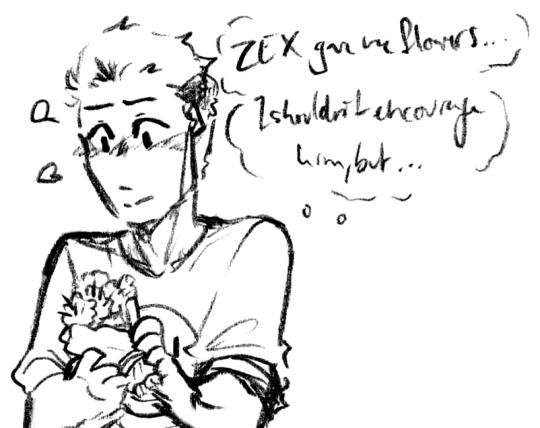
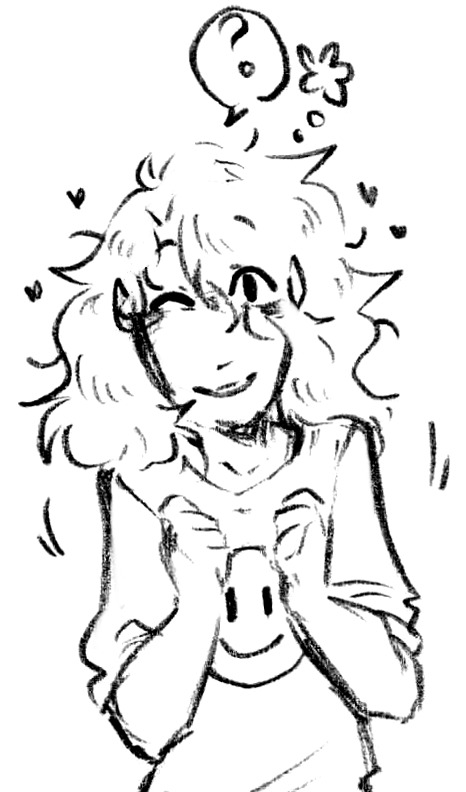
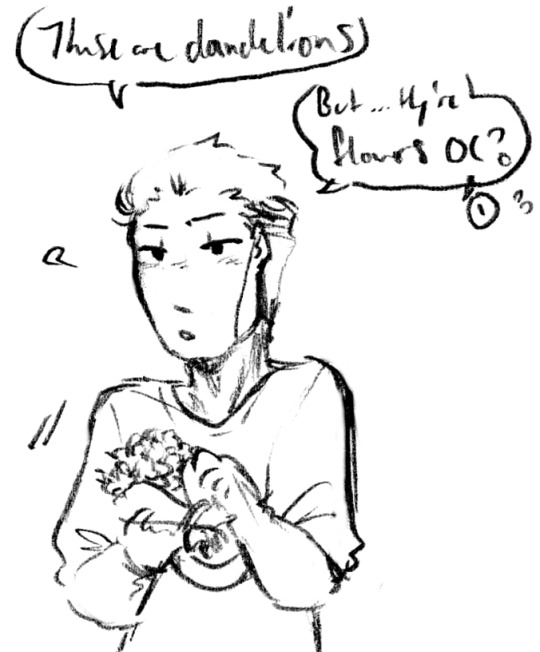
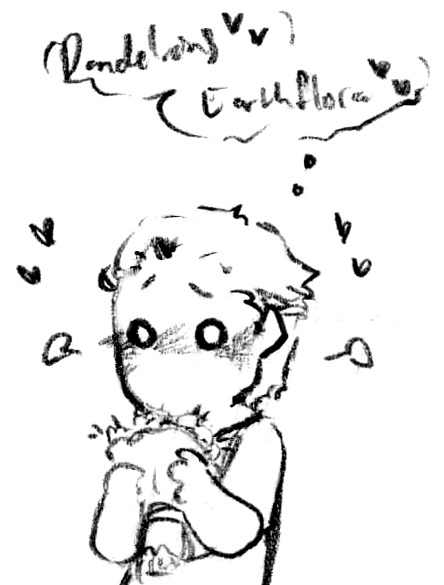
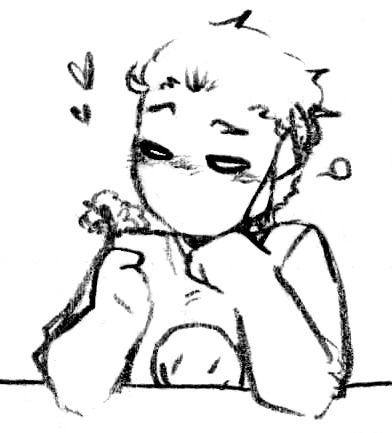
Totally unaffected by this gesture of affection, definitely (Patreon)
#Doodles#SCII#Helix#The Captain#ZEX#Forgive the quality lol I wanted to make them pretty but then- Well you know lol#Dandelions <3 <3 <3 <3 <3 <3 <3#You know it's bad when you start getting excited about the most mundane little signifiers <3#Dandelions deserve way more love than they get anyway it all balances out#I just hghh it's such a simple setup but there's a lot of feelings that can be expanded upon!#Like would Zelnick know about dandelions cultural ties?? He grew up on Unzervalt - unless someone brought some with them!#Or explained it I guess - but also Unzervaltians seem like scrappy underdogs sprouting up in the sidewalk cracks to defy the Ur-Quan too#Feels like it would actually mean a lot to him if he knew their symbolism!#But even if he didn't - they're Earth Flora! A piece of his home that /should/ just be mundane and everyday and not a big deal but it is!!#I legit teared up at Zelnick appreciating a blue atmosphere ah <3#He loves Earth so much wah <3 The naturalistic storytelling in his internal monologue are genuinely So Good#And then y'already know I love ZEX gifting him flowers lol I really do need to finish that one comic I posted the preview of it's cute!#Any little way that he engages with human courtship is The Cutest to me <3 Trying so hard to impress his love!#Trying so hard to cross that cultural gap agh it gets me bad! Seeing humans as more than just pretty somethings to be enjoyed at a distance#ZEX's pride also gets me bad hehe but I really love when he uses his intelligence to try to relate and understand#See humans as complex individuals both personally and in different cultures! He gets so distracted so easily hehe silly ♪#Also I don't know if I have anywhere else that it'd come up but agh gods his and Zelnick's conversation about the eventual fallout of ZEX's#kidnap attempt - Literally The Best like ugh!! ♥ I /tried/ to write something half that exact and eloquent and it's just right there! Gah!!#S'beautiful s'so good fjdslafd I'm love I'm love
10 notes
·
View notes
Text
Okay but the weirdest thing about the whole "Brotherhood is better you should skip 03" discourse that's become commonplace now, it sort of forgets the world Brotherhood came out in and why you should watch the original Fullmetal Alchemist.
When Brotherhood came out, the original Fullmetal Alchemist was one of the most beloved and most watched animes of all time. Brotherhood assumes you the audience have already seen it because of course you have, everyone has seen it, so it skips important information and speeds the story up because it doesn't want to bore you with things you already know. Have you ever wondered "hey why does the first episode of Brotherhood kind of suck, and why am I being introduced to like 50 new characters, and why are they acting like I know what the hell an alchemist is?" It's because Brotherhood thinks you've seen 03.
The first 7 or so episodes of Brotherhood constitute dozens of chapters in the manga, and the first 25 or so episodes of the original Fullmetal Alchemist. The Nina Tucker episode in Brotherhood, in FMA 03 takes up nearly three episodes. Yoki gets a backstory in 03 and it's genuinely one of the best episodes and taken directly from the manga and Brotherhood glosses over it because: duh, you've already seen it.
And so if you skip the original you miss out on dozens of really great character building episodes like Ed and Al meeting Hughes for the first time and getting to spend a whole episode helping him free a train from terrorists, or Ed and Roy having a duel that expands on the relationship they have, or episodes where the brothers just help out random people in towns before the major story gets going.
The original also paces itself quite a bit better than Brotherhood and is more in line with the mangas storytelling. In the manga we don't find out about The Gate until nearly two dozen chapters in, and the same goes for the original anime. Like, that's a twist reveal in those stories, and it's weird that the most watched series is the one where they tell you all about The Gate in the first two episodes because they assume you've already seen the original show.
What's more, people don't know that Hiromu Arakawa helped write for the anime while she was still in the middle of writing the manga, and as a result was inspired to write scenes in Brotherhood that the anime did first. That scene of Edward getting impaled by a falling beam? Directly inspired by a similar scene in the original anime. There's a lot of little instances of that and they're great when you can recognize parallels and things in Brotherhood that are direct references to the original anime, but people don't notice any of that anymore.
Because the original anime is just an automatic skip these days, and it's a bummer because people don't realize what a giant it was back before Brotherhood was released. They treat it as *bad,* not realizing it was one of the most beloved anime of its time and the problems people take issue with have a lot more to do with personal taste than any kind of actual flaw in the writing. Brotherhood was never meant to dethrone it, and the original anime was always supposed to be part of the viewing experience which is why those first few episodes of Brotherhood are so fast paced.
So like, please stop telling people Fullmetal Alchemist 2003 is a skip, or it's bad, or you don't need it because Brotherhood is better. Regardless if you think Brotherhood is better or not, the original wrote Brotherhood's check. It was huge, it was beloved, and Brotherhood is *banking* on the knowledge you've seen all of it and loved it. And trust me when I say there is so much to love about the original series. It's still my favorite branch of the FMA franchise, and it's worth your time, I promise you.
#Fma 03#FMA#fullmetal alchemist#Fma:b#fullmetal alchimist brotherhood#fma brotherhood#Legitimately though the original is so fucking good#The music alone makes it worth the watch#Also the art direction is better fight me#mild spoilers
7K notes
·
View notes
Note
Should I read homestuck
tl;dr: no
actual answer: yes, but with some extremely important caveats.
Firstly, because Adobe shitcanned Flash, you can now no longer experience Homestuck in the form it was intended upon release... unless you download the Unofficial Homestuck Collection. This act of unbelievable, nay, saintly generosity by Homestuck's most dedicated fans allows you to experience Homestuck as it was intended - as close as is humanly possible.
"As close as is humanly possible" is the key phrase here. One indelible part of the original Homestuck experience was UPDATE! Homestuck would sometimes go weeks or even months (and later, years) between updates. I wasn't on Tumblr back in the day, but at the peak of Homestuck, even if you knew nothing else about it, you'd know when an update dropped because Tumblr's net traffic would increase something like three to fourfold. People would go apeshit bananas about whatever new revelations the Huss would drop on us.
You also need to realise that Homestuck is a product of its time and while its takes on sexuality and gender identity was pretty progressive (for its time), Huss did use the r-slur a bunch.
While we're on the subject of the author, Andrew Hussie (of whom my current understanding is that they have not changed name but go by they/them nowadays) is, in the most diplomatic possible terms, a very unique person. They are, at times, a visionary storyteller with genuinely fascinating ideas. At other times, they come off as kinda spiteful towards their readers.
Without meaning to dip into spoilers, some story beats seem (in my opinion) almost intentionally calculated to upset, irritate or mock certain fans. It never rises to the sheer vicious contempt that Steven Moffat had towards Sherlock's fanbase, but it does leave a bad taste in my mouth whenever I go back.
Additionally, and this is where a sort of birds-eye-view spoiler is unavoidable, the story suffers from the Game of Thrones pitfall of repeatedly increasing its own complexity by adding new plot threads without resolving existing ones, eventually leading to fatigue on the part of both the reader and the author. The arcs of a lot of characters just straight up get abandoned, while a couple of characters take an unnecessarily large amount of screen time.
There's one character in particular that the author openly states within the narrative (the author exists within the world of the story. It's... a whole thing) that they favour, and whose behaviour the story is warped to accommodate. You'll know exactly who I'm talking about almost the moment they show up.
Another reason I say that it's not really possible to read Homestuck as it was originally intended is because a lot of the shit that happens in it fits into the zeitgeist of the internet at the time any individual update was written. There's a whole section in the late middle third that is inextricably and very specifically tied to how it was like to use Tumblr in 2012.
Additionally, a lot of things have soured with time. There was the whole Hiveswap debacle (it was first announced in 2012. We got the first act in 2017. We got the second act in 2020. We do not even know if the third act will ever come out.). There were the legal threats. There were the Epilogues and Homestuck 2, which were... how do I put this? Not universally liked. There's been nearly a decade of discourse since Homestuck ended, and a lot of things haven't grown better with age.
All of that being said.
You should read it.
I cannot express to you just how big an impact Homestuck has had on internet culture. Even people who claim to hate Homestuck unconsciously use slang that it invented. Its unique ideas on storytelling, character design and narrative chronology have, in both subtle and unsubtle ways, changed the way millennials and Gen Z tell stories.
A lot of people were inspired to tell stories because of Homestuck - one example I always give to Lancer players is that Kill Six Billion Demons started as a comic on the MSPA forums (before it was homestuck.com, it was MS Paint Adventures), so Homestuck is in an indirect but demonstrable way responsible for the existence of Lancer. The sunglasses that Gideon Nav from the Locked Tomb wears have been explicitly stated by Tamsyn Muir to be Dave Strider's. Toby Fox made music for Homestuck, and worked on large parts of Undertale while living in Andrew Hussie's basement.
We also know someone in the Bluey creative team is a Homestuck, because...

There are subtle but direct references in Bojack Horseman, Hazbin Hotel, Steven Universe, Adventure Time - and those are just the ones that it's easy to prove! In a more general sense, I think there's a lot of cartoon series, movies, games, etc. that would either be very different or wouldn't exist if Homestuck hadn't happened.
It's certainly influenced my work.
I think, being very cautious to manage your expectations, that you should read Homestuck. At the very least, a lot of things people say on Tumblr will start to make, if not sense, a different kind of nonsense.
689 notes
·
View notes
Text
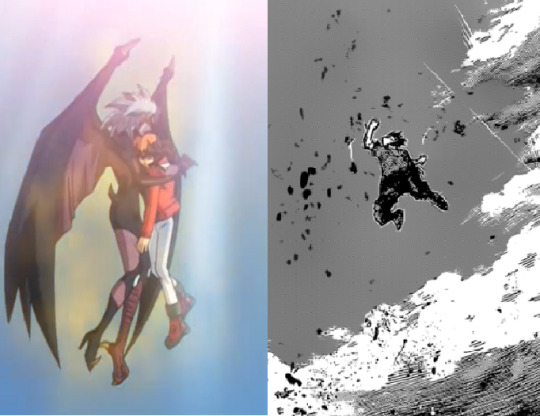
SHIGARAKI VS. YUBEL: HOW TO SAVE YOUR VILLAIN
The failure of Deku to save Shigaraki isn’t just a tragic conclusion for Shigaraki’s arc, it’s also My Hero Academia failing as a story. When I say the story failed, I mean the story has failed to answer any of the questions it asked its audience. It’s themes, character arcs, everything that communicates the meaning of the story to the audience is no longer clear.
Saving Shigaraki was the central goal of not only the story itself, but the main character Deku. By failing in its goal you can’t call this a good ending. In order to illustrate why this goal of saving the villain is so important to both Deku’s character and the central idea of MHA, I’m going to provide a positive example in Yu-Gi-Oh GX were the main character Judai successfully saves their villain.
One of these stories fails, and the other succeeds. I will illustrate why under the cut.
BROKEN THEMES = BROKEN STORY
When artists draw they have to consider things like perspective, anatomy, shading, light, coloring. Drawing has rules, and it’s hard to produce good art without knowing these rules beforehand. If I draw something that has bad anatomy, you can criticize me for that.
Writing has rules, just like drawing. The rules of storytelling are important because writing is an act of communication. You can write whatever you want, just like how you can draw whatever you want, but if you break the rules the audience won’t understand what you are trying to communicate.
When I refer to MHA as a broken story, I am referring to the fact that it has broken the rules of storytelling. As this youtuber explains.
“I guess we should first define what broke and broken even means in this context. Has the story turned into an unintelligible mess? Not really. Value judgements aside, the narrative is still functional and fulfills the criteria of being a story. So how can a story that still functions be broken? Maybe to you it cannot. But to me a story that is still functional isn’t enough. What I mean when I say MHA is broken is that it’s lost something crucial. A codifying style of structure, pacing and payoff that until a certain point was the core of its identity.”
I could launch into a long-winded explanation of what themes are, but for the sake of simplicity I like to define themes in terms of “Ask, and answer.” The author asks a question to the audience, and then by the end of the story provides an answer. The audience is also invited to come up with their own answer which prompts them to think about the story on a deeper level.
The question both MHA and GX are asking both its main characters and the audience is “Can you save the villain?” with the additional complicated question of “Should you save the villain?”
This post will detail how both stories go about answering those two questions, and more importantly why those answers matter for the story.
With Great Power… You know the rest.
My Hero Academia and Yu-Gi-Oh Gx are actually similar stories once you get past their superficial differences. MHA is a story with way better worldbuilding, compared to a society where everything revolves around the trading card game, and people go to school to be better at a trading card game.
However, if you get past that. They are both bildungsroman, stories about the main characters growing up into adults. They both have an academy setting where the goal is for the main character to graduate and enter the adult world. They are both shonen manga. GX is the sequel of Yu-Gi-Oh a manga that ran in Shonen Jump the exact same magazine as MHA.
The biggest point of comparison is their main characters, who both start out as young and naive who are driven by their admiration of heroes. Deku is a fan of All Might who wants to become a hero despite not having a quirk, because he loves All might who saves everyone with a smile. Judai’s entire deck archetype revolves around “Elemental Heroes’ and later “Neo-Spacians” who are all based on popular sentai heroes like ultraman.
The central arc for both characters is to grow up. Growing up for both of them not only requires figuring out what kind of adult they want to be, but also what kind of hero they want to be.
Now I’m going to drastically oversimplify what a character arc is.
A character arc first starts out with the character being wrong. Being wrong is essential because if the character is right from the beginning, then there’s no point in telling the story. A character often holds the wrong idea about the world, or has some sort of flaw that hinders their growth.
The narrative then needs to challenge them on that flaw. It usually sets up some kind of goal or win condition. That flaw gets in the way of a character “winning” or achieving their goal, so they need to fix that flaw first.
If their ideals are wrong, then they need to think about what the right ideals are. If they’re too childish, they need to grow up. If they have unhealthy behaviors or coping mechanisms, they need to unlearn it and require better ones. Otherwise, that flaw will keep sabotaging them until the end.
I’m borrowing the word “win condition” from class1akids here because it’s an incredibly appropriate terminology. Midoriya needs to do “x” in order to win, otherwise this victory doesn’t feel earned. The “x” in this case is usually character development. As I said before, a story where the main character hasn’t changed from beginning to end feels pointless. Especially in Deku’s case, he was already a brave, strong hero who would charge right into battle and defeat the bad guys in chapter one, so him defeating Shigaraki in a fist fight doesn’t represent a change.
The story sets up not only “What does the hero need to do to win?” but also “How does the hero need to change in order to win?” A character either meets these requirements before the end of the story, or they don’t and usually this results in a negative ending.
MHA in its first half quite clearly set up both the final conflict of saving the villains, and also that saving the villains is its “win conditions.” The hero shouldn't be allowed to win without first fixing this flaw.
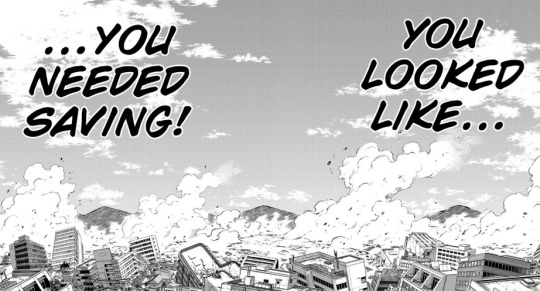
From this panel onward the central question Deku is forced to answer shifts from “Am I strong enough to defeat ShigarakI” to “Can I save Shigaraki?” However, much earlier than that All Might goes on to basically set up the win conditions of what makes the ultimate hero as someone who “Saves by winning, and wins by saving.”
All might: You can become the ultimate heroes. Ones who save by winning, and win by saving.
Therefore the story has set it’s criteria for what kind of hero Deku needs to become. If he wins without saving, then he’s failed to become what the series has set up as the Ultimate Hero.
Shigaraki and Yubel aren’t just narrative obstacles, or boss monsters to be killed like in a video game. They are narrative challenges, which means that the character can’t grow in any way if they don’t answer the challenge presented by the characters. They are villains who actively resist being saved, to provide a challenge for two heroes who define their heroism by saving others.
The challenge they pose adds a third question to the story and the main characters.
"Can I save the villain?"
"Should I save the villain?"
"If I don't save the villain, then can I really call myself a hero?"
In other words the decision they make in saving, or not saving their final antagonist defines what kind of hero they are. In Deku’s case it’s even more critical he defines what hero he wants to be because the MHA is also a generational story, and several of the kids are asked to prove how exactly this generation of heroes is going to surpass the last one.
The kids growing physically stronger than the last generation isn’t a satisfactory answer, Deku getting strong enough to punch Shigaraki hard is not a satisfactory answer, because we are reading a story and not watching a boxing match.
I’m going to focus on the last two questions though for a moment. Many people who argue against saving villains like Shigaraki argue he is a mass murderer and therefore isn’t worthy of salvation.
However, the act of saving Shigaraki isn’t a reflection of Shigaraki himself, but rather the kind of hero Deku wants to be. It all boils down to Spiderman.
In the opening issue of Spiderman, teenage Peter Parker is bitten by a radioactive spider and suddenly gains super strength, the ability to stick to walls along with other powers. However, being a teenager he uses these powers selfishly at first. He doesn’t feel the obligation to use his powers for other people, and therefore when he sees a robbery happening right in front of him he lets the robber go.
However, because he lets the robber go, the robber then attempts to hijack a car and kills his Uncle Ben in the process. If Spiderman had stopped the robber then he might have prevented that from happening. He had the power to stop the robber, but he didn’t feel responsible or obligated to save other people. As a result Uncle Ben dies. It’s not enough to have power, ti’s how you use that power that reflects who you are, therefore: “with great power comes great responsibility.”
The choice to save Shigaraki actually has little to do with whether or not Shigaraki is redeemable, but rather how Deku chooses to use his power, and what he thinks he is responsible for reflects who Deku is as a person.
Deku himself also clearly outlines how he wants to use his power, that One for All is a power for saving, and not killing.
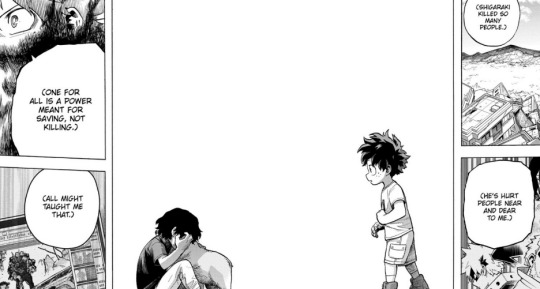
How he uses his power reflects Deku’s ideal in saving others, and therefore if he doesnt use his power to save, then he’s failed to live up to his ideals. It's not whether it's morally right to save a murderer like Shigaraki, but rather the way Deku wants to choose to use his power. It's about whether he feels the responsibility to save others.
Judai explores an incredibly similar arc to Deku. They are basically both asked what kind of responsibilities a hero is supposed to have, which is also a metaphor for growing up to handle the responsibilities of adulthood. As both characters start out with incredibly naive and childish ideas about what a hero is. Therefore realizing what a hero is responsible for is key to them growing as a character.
However, Judai is different from Deku. In some ways he’s more like Bakugo. Judai is a prodigy who’s naturally good at dueling. He doesn’t duel to save others, but rather because duels are fun and he’s good at it. He’s very much like Bakugo, who admired All Might as a hero just as much as Deku did, but admired the fact that he was strong and always won rather than he saved others.
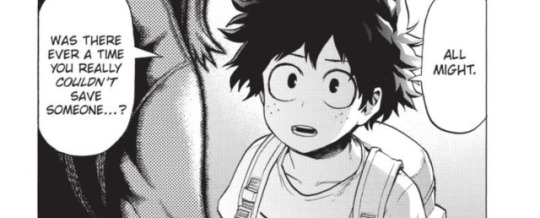
However, I would say both Deku and Judai are questioning what a hero is responsible for. They are both asking if they have the responsibility to use their power to save others. If they have to fight for other people, just because they have power.
His first big challenge as a character comes from Edo Phoenix, who calls out Judai for not thinking through what it means to be a hero, and what responsibilities heroes carry. Judai duels because he thinks it’s fun. He will show up to duel to help his friends, but that’s because he’s the most powerful person in the group. Even then it’s because he finds fighting strong opponents to be enjoyable. Bakugo will beat up a villain, but for him it’s more about winning then if the action will save someone or not.
Judai is more often than not pushed into the role of being a hero, he doesn’t play the hero because he’s a particularly selfless person, and he’ll often avoid responsibility if not forced. He has power but no sense of responsibility and the narrative calls them out as a problem.
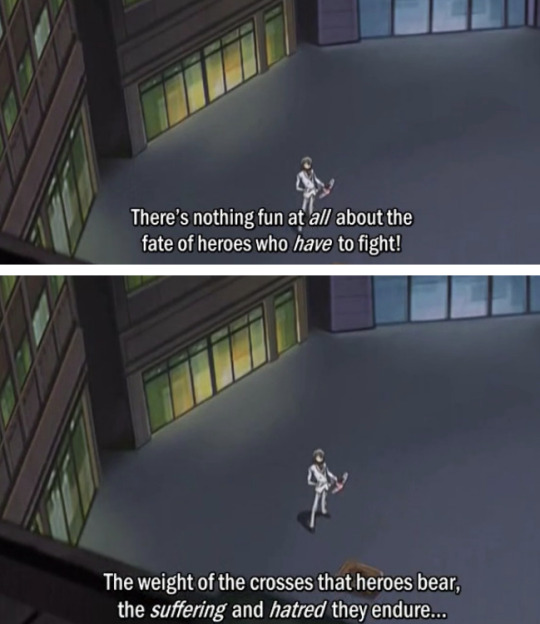
Edo: Can you even fathom that, Judai?
For Judai, he can’t understand the responsibility of being a hero. For Deku, he idealizes heroes so much he can’t understand that there are people out there the heroes have failed to save. These two callouts towards Deku and Judai are discussing similar because they’re both discussing where a hero’s responsibilities lie. Is a hero responsible for saving everyone? Is someone strong like Judai responsible for using their strength to help other people?
Judai’s arc continues into the third season where he’s not shown to just be naive but ignorant. He’s not just childish, he actively resists growing up because he doesn’t want to take on adult responsibilities.
THe same way that Deku just decides not to think about whether or not All Might failed to save people in the panels above. However, in Judai's case he's actively called out for his choice to remain ignorant.
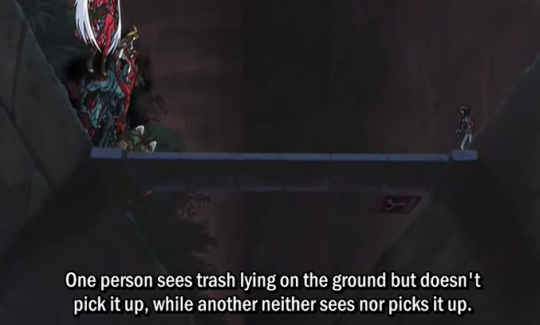
Satou: Now, which one is at fault?
Judai: Isn’t it the guy who saw it, but didn’t pick it up.
Satou: Not quite. If one is aware of the trash that fell, it may be picked up someday. But there is no possibility fo the unaware one ever picking it up. Judai-kun you are the foolish one unaware of the trash that has fallen.
Judai: Are you calling me out for how I am?
Satou: Your behavior towards me was atrocious. The worst was attending class only for credit, even if you were there you only slept.
Judai: Yeah, I know. I was all bad, but it wasn’t that big a-
Satou: It is important. You see, one by one, the students inspired by your attitude were losing their motivation. Now if you were a mediocre duelist, then this would not be an issue.
Satou: However, you are the same hero who defeated the three mythic demons. Every single student in the academy admires you. You should have been a model for this academy.
Judai: Me, a role model? Are you kidding? I just do whatever I feel like doing.
Satou: Great power comes with great responsibility. Yet, as you remain unaware of that, you’ve spread your lethargy and self-indulgence.
seems like a minor issue, but look how Judai responds to the accusations. “I just do whatever I feel like doing.” Satou is arguing that Judai should pay attention to the influence he has on others because of his power, because how he chooses to use that power affects others. However, Judai chooses to actively not look at the consequences of his actions because he doesn’t want to take on that level of responsibility, and therefore he’s looking away from the trash.
While it seems like it doesn’t matter in Satou’s specific example, not thinking of the consequences, or how you use your power can have unexpected consequences. Spiderman doesn’t feel like it’s his responsibility to stop a bank robber, and that bank robber shoots his uncle. You could still argue it’s not Spiderman’s responsibility to stop every crime in the world, and I guess no one owes anyone anything from that point of view - but Spiderman failing to act responsibility had the consequence of directly hurting someone else.
Spiderman has to live with that consequence because it was his own Uncle that was hurt.
This is where we really reach the duality of Judai.
In GX, Judai is, symbolically speaking, The Fool of the Tarot Deck, the Novice Alchemist — a person brimming with infinite potential, yet one who is also supremely ignorant, who walks forward with his eyes closed and often unknowingly causes harm in his great ignorance. In this, he is very much the embodiment of the faults we most commonly associate with teenagers — selfishness, recklessness, shallowness, a lack of dedication or empathy when it’s most needed. Like most people, he has good traits that work to balance out some of the above, but his narrative path through GX ends up being that of the flawed hero undone by his faults — and then that of the atoner, the repentant sinner. In his case, the mistakes of his teenage years are the catalyst for his growth from a boy into a man burdened with duty and purpose.
Judai is someone with infinite potential, with great power, but also ignorant on how he should use that power, and that makes him an incredibly flawed hero who needs to learn how that power should be used.
Deku similarly exists in a society where heroes deliberately turn a blind eye to the suffering of a certain type of victim. Shigaraki’s speech heavily resmebles Satou’s speech about garbage on the side of the road.
Shigarali: "For generations you pretended not to see those you coudln't protect and swept their pain under the rug. It's tainted everything you've built."
Deku shares Judai’s ignorance, because he’s not only a part of a system that doesn’t even see trash on the side of the road, but he also worships heroes so much that he’s incapable of criticizing them. If Deku saw the flaws of heroes, but at first didn’t have the courage to speak out, but eventually gained the courage that would be one thing. However, if he doesn’t see the flaws of heroes, then the problem will never be fixed.
There are also consequences for both Judai and Deku failing to use their powers responsibly. These consequences take the form of the villains who came about because of all of society’s ignorance to the suffering of victims (Shigaraki) and because of the main character’s ignorance to their suffering (Yubel). Shigaraki and Yubel are also explicitly victims that the heroes failed to save, turned into villains who are active threats to the heroes.
Should I save the villain?
The answer is yes, because the decision to save is reflective of the kind of hero each character wants to be. Each story clearly sets up that Deku and Judai aren’t punisher style heroes who shoot their villains, they are being set up as heroes who save.
Deku needs to “save by winning.”
As for Judai, a big deal is made of Judai’s admiration for another character Johan who represents a more idealistic kind of hero. Johan unlike Judai is someone who duels with a purpose, something Judai outright says he admires because he’s empty in comparison.
Judai: Johan what have you been dueling for? See, it’s about fun for me… Well, for the surprise and happiness too. I guess I do do it for the fun. Sorry, I guess I put you on the spot by asking out of nowhere.
Johan: What’s this about Judai?
Judai: It’s nothing.
Johan: I suppose there is one goal I have.
Johan: Even if someone doesn’t have the power to see spirits, they can still form a bond with a spirit. That’s why I do it for people like him.
[...]
Johan: I'll fight for everyone who believes in me, and I'll do it with my Duel Monsters.
Judai: I'm jealous you've got feelings like those in you.
Becoming a hero who uses their power to help others isn’t just a goal the story sets for Judai, it’s a goal that Judai sets for himself because of his admiration for Johan. Johan represents the idealistic hero Judai wants to be, but is also held back from because of his personality flaws. Johan represents the kind of heroic ideal that Deku is aspiring to be.
Johan’s ultimate goal isn’t punishing the wicked, but to use his power to save others.
Johan: Judai, it was my dream to save everyone through my dueling!
The story sets up the idea that it’s not enough for Judai to simply be strong, he’s also challenged to become a savior who uses his power to help others like Johan.
Deku needs to “save by winning” and Judai needs to “Save everyone through his dueling.” However, Johan also adds another condition to what saving means. His idea of saving isn’t to defeat a villain, but rather his dream is to help connect spirits and humans together, even if there are humans who can’t see spirits. Johan doesn’t save people with the power of physical force, but rather the power of human connection.
Should I save the villain?
Here the answer is "Yes", because wants to become more like Johan someone who uses their power to help others not just for themselves.
Then we reach the third question
If I don't save the villain, can I really call myself a hero?
It once again comes to power and responsibility. Heroes have great power, and they are responsible in how they use that power, if they use it irresponsibly then there are consequences. Shigaraki wants to destroy hero society, because the heroes irresponsibly use their power to turn a blind eye to everyone’s suffering.
People suffer when heroes fail to live up to their responsibilities.
The entire conflict of season 3 is created by Judai failing to save Yubel. If Judai had helped Yubel when they most needed it, instead of abandoning them, then Yubel would never have been twisted by the light of destruction, would never have attempted to teleport the school to another dimension, would never have attacked all of JUdai’s friends.
These consequences matter.
Deku can turn his eyes away from Shigaraki’s suffering, but let’s say a hero failed to stop a robbery, or rather he didn’t even try, and because of that his mom was shot and died in the street.
Would Deku consider the man who failed to stop a bank robbery a hero?
When Spiderman let a bank robber go instead of trying to stop him, was he being a hero in that moment?
Both the stories and the characters themselves have defined heroes as people who use their powers to save others, therefore if Judai and Yubel fail to save their villains then they can’t be called heroes by the story’s own definition. Now let’s finally return to the question of "Can I save the villain?"
Was there ever someone you couldn’t save?
m going to start with Yu-Gi-Oh Gx as a positive example of how to save your villain.
Gx works for two reasons. One, it’s established from the start that Yubel isn’t beyond salvation, and two, it makes it so Judai can’t win without saving Yubel. The conflict of the story does not end until Judai makes the decision to save Yubel.
In some ways the writing is even stronger because Judai is directly responsible for the pain and suffering that Yubel went through that turned them into a villain in the first place. Yubel isn’t just a victim, they’re specifically Judai’s victim.
Yubel is a duel spirit who is also essentially Judai’s childhood friend. A duel spirit just like the kind that Johan wants to save. During their childhood Yubel got too overprotective of Judai, and started to curse his friends for making him cry or upsetting him in any way. Until everyone Judai’s age started avoiding him and Judai became all alone with only Yubel for company.
Judai’s decision was to abandon Yubel at that time. He took the yubel card and shot them into space, hoping that being bathed in space rays will somehow “fix” what was wrong with them. I know that’s silly but just go with it. Judai abandoning Yubel had the unintended consequence of Yubel being subjected to the light of destruction, a corrupting light that subjected Yubel to years of pain. This pain literally takes the form of Yubel burning alive.
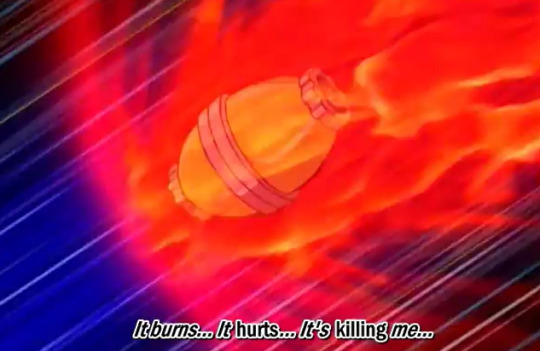
Yubel connected to his dreams called out for Judai every night, only for Judai’s parents to give him surgery that repressed his memories of Yubel causing him to forget them entirely. Yubel then spent the next ten years alone in space, continuously subjected to painful torture, with their cries for help being ignored.
"I was suffering even as you came to forget about me..."
Yubel is then met with the question of how can Judai treat them this way if they loved him so much? As from Yubel’s perspective, they’ve only ever tried to protect Judai, only for Judai to not only throw them away, but subject them to painful torture and ignore their cries for help. Judai effectively moves on with his life, goes to duel academy, makes friends while Yubel is left to suffer in silence all but forgotten.
This is where Judai’s ignorance has serious plot consequences.
It’s not just the pain that Yubel endured that made them snap. It’s that their pain went ignored.
Yubel holds out the faint hope that Judai will answer their calls fro help until they finally burn up upon re-entry into earth’s orbit. At which point they’re left as nothing more than a single hand crawling on the ground.
Yubel who cannot fathom why Judai would cause them so much pain, and then forget about them, convinces themselves that Judai must be causing them pain, BECAUSE he loves them.
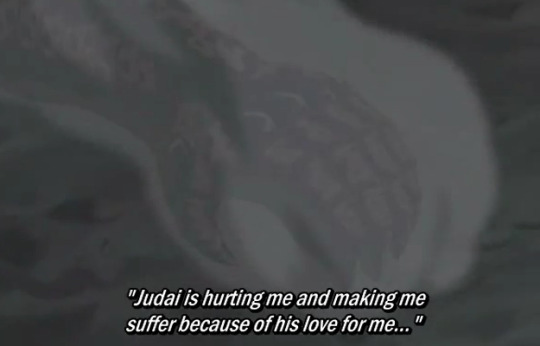
But you see, I couldn't possibly forget about you in the time that I've suffered...
Judai is allowed to move on with his life, to make friends, to spend the next ten years doing so while Yubel is subjected to ten years of agony. When they finally escape their painful torment, they see all the friends Judai has made while they’re left alone and forgotten.
However, Yubel’s goal isn’t revenge. Rather, it’s to make Judai share and recognize their pain. WHich is why I said it’s not the fact that they were made to suffer, but their suffering is ignored. Yubel’s entire philosophy revolves around the idea that sharing pain is an expression of love, and that they and Judai share their love for each other by hurting each other.
"That's why I sought to fill all those linked to you, your world, with both sadness and anguish..."
For Yubel, making all of Judai’s friends suffer and Judai themselves suffer is a way of making them and Judai equals again. They want to show “their love” for Judai, but it’s more about forcing Judai to recognize the pain he’s caused them by forcing him through the same pain.
Yubel’s philosophy of sharing pain is actually a twisted form of empathy.
They’re not entirely wrong either, that even people who love each other can cause each other pain, and that if one person is suffering alone in a relationship or the suffering is one-sided then there’s something wrong with that relationship.
Yubel: I get it now… You weren’t in love, with Echo.
Yubel: No.. you may have loved her just enough to clear the conditions in palace for you to control Exodia, but the you didn’t truly love each other.
Yubel: You were only unfairly hurting her, while you stayed unharmed. You wouldn’t suffer. You wouldn’t suffer. You wouldn’t be in pain.
Amon: What are you getting at?
Yubel: I’ve been hurt! I’ve suffered! I’ve been in pain. That’s why I’m making JUdai feel the same things I did!
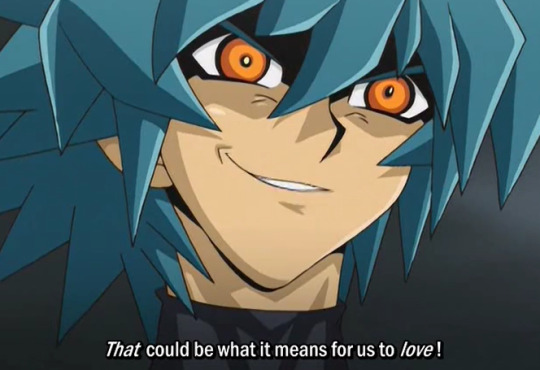
Yubel’s twisted theory of love, is a pretty thinly veiled cry for empathy.
They break out into tears when talking to Amon about the way they’ve hurt and suffered. They clearly state upfront that their goal is for Judai to recognize their love. One of the first things they say to Judai is a plea for Judai to remember them.
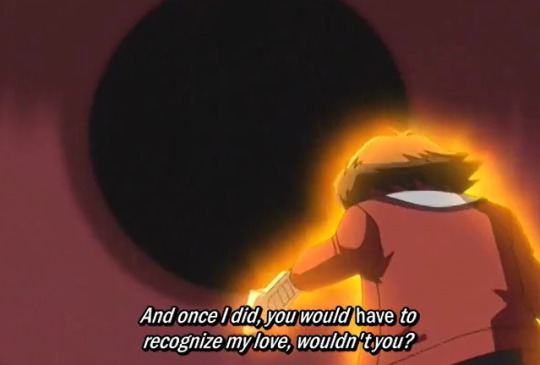
Yubel is presented as a very human character suffering through a lot of pain throughout their entire villai arc, they break down into tears multiple times, they cry out in agony, they're visibly suffering and you see their mental walls begin to break down when Judai denies them any empathy.
Yubel is actually incredibly clear and straightforward about their desire to be saved by Judai. However, Judai doesn’t lift a single finger to help Yubel the entire arc, even though they themselves admit they are directly responsible for Yubel’s suffering but they helped create who they are today.
Judai plunges into a different dimension and gives up everything to save someone, but it’s Johan, not Yubel they try to save. You have Johan, the perfect friend, and perfect victim that Judai gets obsessed over and will not stop at anything to save, and then you have Yubel, the imperfect victim that is actively harming Judai and all of his friends that Judai chooses to ignore.
The whole season Judai only focuses on saving the perfect victim Johan, and this is clearly shown to be a flaw. Judai doesn’t just ignore Yubel to save Johan, he also ignores every single one of his friends.
Judai only caring about saving Johan, and deliberately ignoring and abandoning the friends who came with him to help, essentially abandoning them the way he did Yubel leads to another consequence. After he abandons them they get captured, rounded up, and actually die and become human sacrifices.
Losing his friends, causes Judai to snap. Judai becomes the supreme king and decides power is all that matters; he starts killing duel spirits en masse in order to forge the super polymerization card. Which means being left alone, suffering alone, being abandoned by everyone causes Judai to snap the exact same way that Yubel did.
In fact Judai is only saved from his darkest moment, because two of his friends sacrifice their lives, trying to get through to him and appeal to his humanity. At that point Judai’s friends could have just chosen to put him down like a mad dog, to punish him for the amount of people he’s killed, but instead they try to save him because of their friendship.
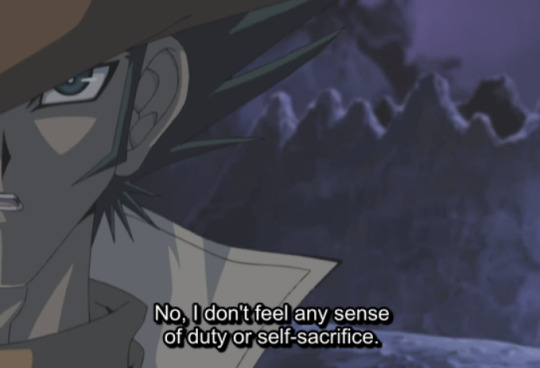
I just want to save my friend. That is all.
By the time Judai is facing Yubel in their final fight, Judai doesn’t have the moral highground against Yubel in any way whatsoever. They’ve both lashed out because of the pain they endured and killed countless people in the process of lashing out.
The only real difference between them is that Judai is lucky. He had friends to support him at his lowest point, while Yubel didn’t. Does Judai learn from Jim’s example, and go out of their way to save Yubel the same way they were saved because Yubel is still a friend?
Nope, Judai tries to kill Yubel at this point.
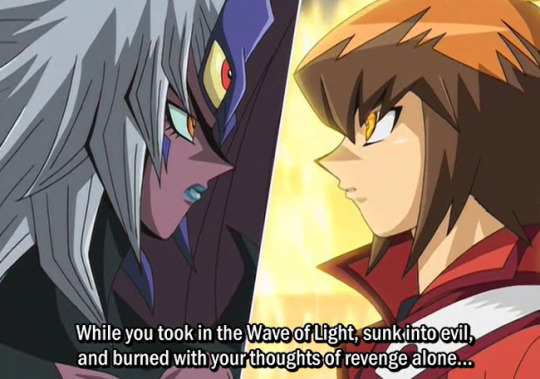
I made a lot of friends...
And they all taught me something… real love is wide enough, large enough and deep enough to fill the universe. Your so-called love is only a conceited delusion.
Like, Judai, sweetie baby honey darling. How was Yubel supposed to make friends when they were floating in the empty void of space?
Judai hasn’t learned, they are still ignorant, and still turn a blind eye to Yubel’s suffering. After all if his love is wide enough, large enough,and deep enough to fill the universe then why don’t thy have any room in their heart whatsoever for empathizing with Yubel?
Judai making friends while Yubel was trapped in space doesn’t make Judai a better person than Yubel, it makes Judai lucky. Judai doesn’t even appreciate that luck, because he treats his friends like garbage.
It’s not about whether Yubel is worthy of salvation, because Judai is a mass murderer and his friends still went to great lengths to save them anyway. It’s that Judai doesn’t want to empathize with Yubel, because they still want to remain ignorant and irresponsible.
Judai wants to continue playing hero, with a very black and white definition of what a hero is. By this point Judai’s killed lots of people, but if he makes Yubel the villain in the situation, he can keep playing hero. He doesn’t have to look at himself and what he’s done, because blaming everything that happened on Yubel and then putting Yubel down like a mad dog allows Judai to absolve his own guilt. Judai practically ignores Yubel’s cries for help, even when Yubel spells it out for them.

I couldn't have lived with the heartache unless I felt that I was being loved...
At this point Yubel themselves acknowledges that their love was just a delusion. That it was a coping mechanism, because they couldn’t live with all the pain otherwise. WIthout it they would have just died, which makes Judai unmoved.
The implication here is that Judai thinks yes, Yubel should have just died in that crater. It would have been easier for Yubel to die a perfect victim, then for Yubel to crawl out of that crater and go on to hurt other people.
While that may be true the same can be said for Judai - it would have been better if Judai died rather than become the Supreme King. His friends could have put him down like a mad dog, you could have even called that justice - but they didn’t.
Judai making no attempt to save Yubel isn’t because he thinks it’s morally wrong to save someone who’s killed as many people as Yubel has, or because he thinks he can’t forgive Yubel, it’s because Judai is taking the easy way out. Johan is a nice, easy victim to save, because he’s Judai’s perfect boyfriend, while Yubel is a complex victim that requires Judai to understand their suffering.
Even the act of saving Johan isn’t about Johan himself, it’s about the fact that Judai feels guilt over Johan’s disappearance. What Judai wants isn’t really to save a friend, but to stop feeling guilty over that friend. Judai isn’t just disgusted by Yubel’s actions towards his friend, he also wants to avoid the guilt he feels over causing all of Yubel’s suffering, because it requires acknowledging the complex reality that he is both victim and perpretrator in this case, just as Yubel is both victim and perpetrator.
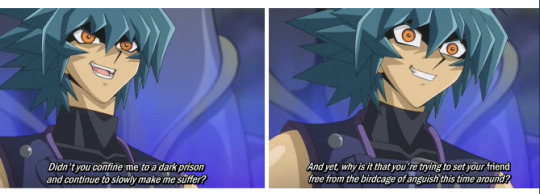
So how can an arc where Judai doesn’t try to save Yubel until the last possible minute, be better than an arc where Deku makes it his goal for the final act of the manga to save the crying boy in Shigaraki?
It’s because the story does not let Judai get away with his continual refusal to empathize with Yubel. Yubel’s entire character revolves around empathy, in the form of sharing pain.
As a duel monster, Yubel’s effect is that they are a 0/0 attack monster who is immune to all damage, but when you attack them they deal all the damage back to you. Which means that Yubel will respond to all the pain they feel, by causing you just as much pain in return.
Yubel is not a character who can be defeated in a fight, or a duel. In fact they’re the only Yu-Gi-Oh villain who never loses a duel once. The most Judai can do is duel them to a draw, and they draw three times. Yubel wins against everyone else who challenges them.
In a way Yubel is like Shigaraki, the ultimate, unkillable enemy that can’t be done away with violence. Judai’s refusal to empathize with Yubel or attempt communication also makes them worse, every time Yubel is hurt they escalate. THe more Judai hurts them, the more they will hurt in return, it’s a cycle that will never be broken simply by killing Yubel, because Yubel is unkillable.
Not only that but the story has gone to great lengths to show that saving Yubel is the correct course of action. If Judai doesn’t save Yubel, he’s basically spitting on the selflessness Jim showed in saving him. In fact if he doesn’t save Yubel, Judai is contradicting his own words on what makes a good friend.
Sho once asks Judai after witnessing his brother change, what he should do if a person you lov ehas changed into an entirely different person. What if they're a person you don't even recognize any more? A person you don’t even necessarily like anymore?
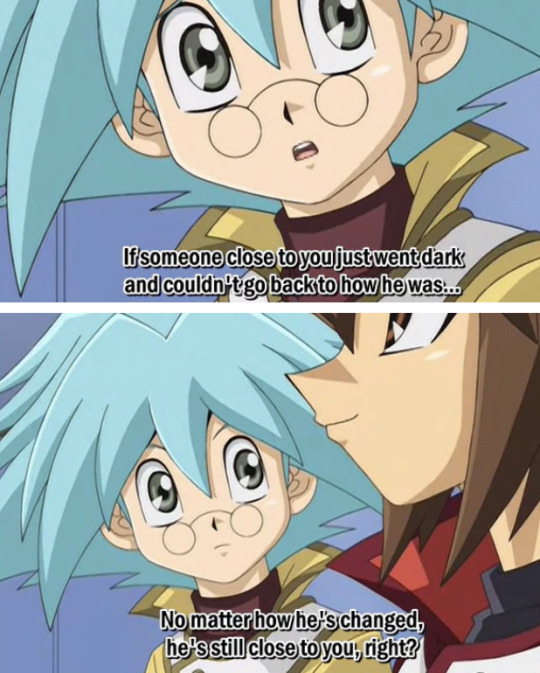
That's why if it were me. I'd probably just be looking after him until the very end, even if I didn't like him. I'd do it cause I think it'd prove that I care about him.
Judai doesn't even say that Sho is obligated to save his brother or morally redeem him, just that he has to keep looking at him instead of turning away or ignoring him.
Judai is being a bad friend, by his own definition. By choosing to deliberately look away from Yubel, Judai’s not living up to his advice for Sho for how you treat people you care about.
Which is why the resolution for Judai and Yubel’s arc is so important, because it’s done by Judai finally acknowledging Yubel’s pain, and promising to watch over them from now on, words that are followed by the action of physically fusing their souls together so they’ll never be alone again.
Judai doesn’t just say pretty words about how they won’t ignore the crying child inside of Yubel, but instead he makes a sacrifice to save Yubel at risk to themselves to show their words are backed up by actions. Judai says Yubel will never be alone again, and then he commits.
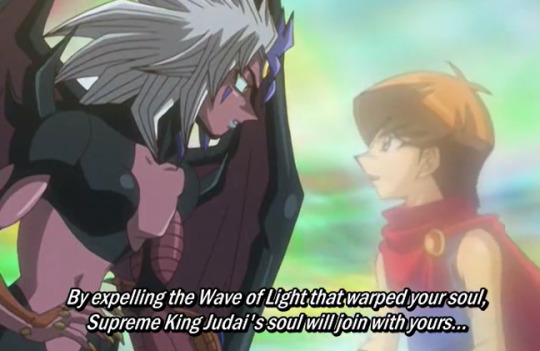
"And even if that means I won't exist anymore... I don't care."
Judai has resolved his character arc by this action, because Judai is finally taking on responsibility and that responsibility is watching over Yubel, so the two of them can atone together. Judai even says himself this isn’t an act of sacrifice on his part, but rather him finally accepting adult responsibilities.
Judai: I wouldn't sacrifice myself for you guys. I'm just going on a journey to grow from a kid into a man.
Judai needed to save Yubel to complete his character arc and grow as a person. If Judai hadn’t saved Yubel, he would have still remained an ignorant child. By learning not to turn a blind eye to Yubel’s pain, and also smacking sacrifices and physically doing something to atone for the way they ignored Yubel up until this point they’ve not only saved Yubel they’ve also done something to address their wrongs.
This also continues into the fourth season where Judai’s personal growth results in him learning what kind of hero he wants to be as in Season 4 in order to atone for the spirits that Judai slaughtered, he decides to leave his friends behind and walk the earth with Yubel helping spirits and humans get along with each other.
In fact Judai’s final speech as a character isn’t even about how strong he is as a hero, but how weak he is as a person.
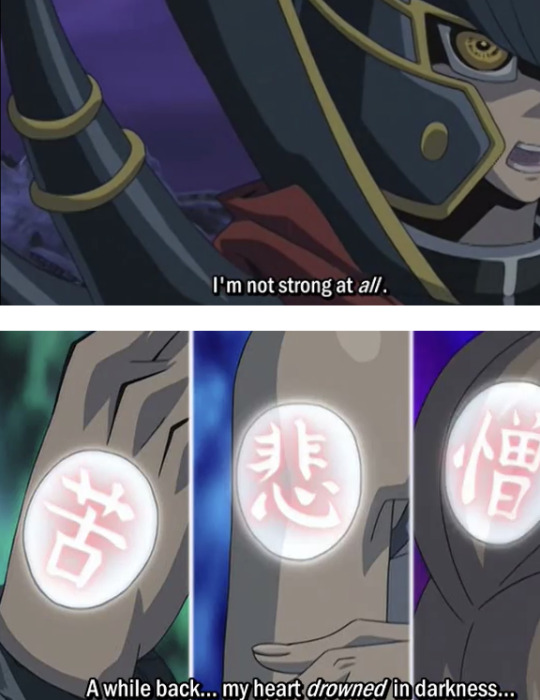
And I put my friends through some rough times. Form that, I figured a few things out... all I can do is believe in them.
The lesson Judai learned is because he’s weak, he needs to empathize and believe in other people the same way that his friends once believed in him when he was at his lowest point. Judai’s not the strongest hero, he’s the weakest one, but that gives him the ability to empathize with people who were lost just like he was, and guide them back from the darkness.
The story of how Deku became the worst hero.
I’m going to say this right now it might turn out next week that Shigaraki is just fine, and he’ll use the overhaul quirk to reconstruct his body. However, even if that happens Deku has completely failed at his goal of saving Shigaraki for the reasons I’ll illustrate below.
In theory, Deku’s arc of saving Shigaraki, and therefore winning by saving should be much easier for the story to accomplish and also much less frustrating to watch. After all, Shigaraki has been around since the beginning of the manga, he’s literally the first villain that Deku faces. He’s also the first villain that Deku talks to, where he brings up the idea that there were some people All Might failed to save.
There’s also many intentional parallels between the two characters, the entire manga is about their parallel journeys of becoming the next generation hero and the next generation villain. Shigaraki even directly quotes the line at one point that all he wanted was for someone in his house to tell him he could still be a hero, the same line Deku said in the first chapter was that he wanted his mom to tell him to be a hero instead of apoalogizing to him for being quirkless.
Not only is the setup for Shigaraki and Deku made obvious (Deku can redeem Shigaraki by telling him that he can still be a hero too), but Deku himself states out loud that he wants to save the crying child inside of Shigaraki.
Judai runs away from Yubel the whole time, whereas Deku is running towards Shigaraki and actively makes it his goal to understand Shigaraki and continue to see him as a human being rather than a villain.
The story also makes it clear that saving Shigaraki is necessary to saving hero society as a whole. After all Yubel is just Judai’s victim. Whereas Shigaraki is the victim of all of society. He’s the crying child who was ignored. The cycle won’t be broken if heroes continue choosing to ignore people like Shigaraki, because more victims will grow up to replace him.
Shigaraki: Everything I've witnessed, this whole system you've built has always rejected me. Now I'm ready to reject it. That's why I destroy. That's why I took this power formyself? Simple enough, yeah? I don't care if you don't understand. That's what makes us heroes and villains.
Shigaraki rejects the world because the world continues to reject him. THe solution to this problem is not rejecting Shigaraki, because Shigaraki won’t go away, the system will just continue to reject people like Shigaraki. As long as heroes and villains don’t understand each other, they’ll keep being forced to fight and the conflict won’t end, because hero society is what engineers it’s own villains.
clear as day by the story itself. If the objective of saving Shigaraki is clear, then how exactly did the story fail in this objective? What went wrong?
In this case it’s a failure of framing, and breaking the rules of “show don’t tell.”
Stories are all about actions and consequences. When a character makes a certain action in a story, the way other characters around them, the world, and whatever consequences that action frames that action in a certain light. It provides context for how we are supposed to interpret that character in that moment.
For example, when a character does something wrong and another character directly confronts them over what they did wrong, that frames them as in the wrong. The story is criticizing the character for what they did wrong.
Context is everything in a story. Stories are just ideas, so they require framing and context to communicate those ideas for the audience. Certain character attributes can be strengths or flaws depending on the context.
My go to example is that if you put Othello in Hamlet, the conflict would be resolved in five seconds because Othello’s straightforward personality and determination would have him kill Hamlet’s uncle without questioning things. Whereas, Hamlet constantly questioning and second guessing himself would lead to the worst ending possible. However, if you put Hamlet in Othello, then Hamlet wouldn’t fall prey to Iago’s manipulations, because Othello doubts and questions everything so he wouldn’t believe Iago the way Othello did.
Hamlet’s contemplative and introverted nature can be a strength in one situation, and a flaw in another. Othello’s tendency to act without thinking things through can be a strength in one situation, and a flaw in another. Context matters, because context tells you how you’re supposed to interpret a certain characters actions, and therefore tells you more about that character.
This is why people repeat “Show don’t tell” as the golden rule of storytelling, it’s one thing to say something about a character, it’s another to us the characters actions in the story itself to show them something about the character.
What’s even worse then breaking the rules of show don’t tell however, is telling the audience one thing, and then going onto show in the narrative something completely different. In that case the narrative becomes muddled and confusing to read. If I the narrator say “Hamlet is someone who overthinks everything” and then in the story Hamlet walks up to his uncle and kills him with no hesitation, then the narrator is straight up unreliable. It becomes impossible to tell as an author what message I’m trying to get across about these characters, because I’m telling you one thing and showing another.
This is why the writing fails in the second half of My Hero Academia because we are constantly told one thing, but then the story shows something entirely different and sometimes even contradictory to the thing we are being told.
Judai is a much worse hero than Deku, he always runs away from Yubel, and we’re never directly told that he’s supposed to save Yubel either. However, the narrative is incredibly consistent. Judai’s behavior of running away is consistent with his character. All the other character call Judai selfish for abandoning his friends (and they’re not even talking about Yubel). Judai is never painted in any positive light for his actions, therefore we as the audience understand Judai’s behavior is wrong and he needs to fix it.
The narrative makes it clear that Judai needs to grow up, and Judai is never rewarded for his refusal to grow up, he’s ruthlessly chewed out, not by his enemies but also by his own friends.
However, the narrative isn’t merciless on him either. Season 3 of GX is dark, but it’s not grimdark. Even when Judai loses his way, he’s still shown love and compassion by those same friends who go to great lengths for his sake. The narrative criticize Judai but it never insists that he’s beyond redemption and needs to be put down like a mad dog.
The message is very clear, that not only does Judai need to grow up, but he also deserves the chance to grow and change, which is why he should give Yubel a similar chance.
In comparison the story sets out this clear narrative arc for Deku of understanding Shigaraki, but it never challenges him for failing to understand Shigaraki. If you listen to what the narrative says, how other characters describe Deku, and what Deku himself says and only read it on a surface level then yes, Deku’s goal is to save Shigaraki.
If you analyze actions however, he is in effect just like Judai he never takes any meaningful action or steps towards Shigaraki, nor does he think of what saving Shigaraki might look like or entail.
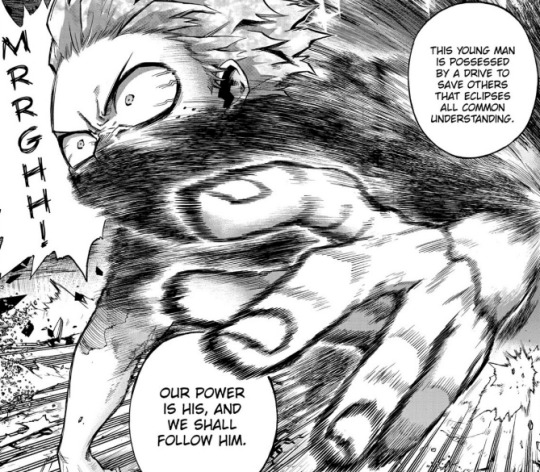
The story describes Deku as someone who is possessed by a drive to save others that eclipses all common understanding, but does the story give us any examples of that behavior?
Judai is characterized as a selfish, irresponsible child, and the story gives us countless examples of his immaturity and how it hurts others. Does the story of MHA do the same for Deku's purported virtues?
Let’s run through Deku’s actions, step by step, the actions themselves and how they are framed in order to find any evidence that Deku possesses this drive to save others. Does Deku reflect at all on the question of:
Can Shigaraki be Saved?
Deku leaves on a journey to try to understand villains. When he makes a perfunctory attempt to understand and empathize with Muscle, and Muscle replies that some people are just evil does Deku keep trying to reach his heart?
Nope, he just punches him.
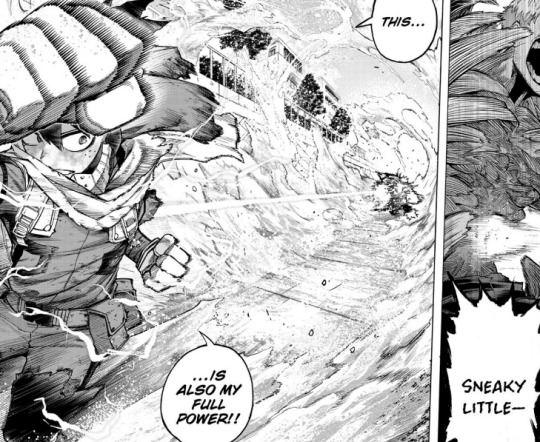
Well, if he’s failed in his goal of understanding a villain then does the story call him out on his failure? Does Deku face any sort of narrative consequence for that failure? Is he framed negatively for failing to understand Muscle, the same way that Judai is framed for abandoning Yubel?
Nope. Deku doesn’t express any frustration at all over is inability to reason with Muscle. There’s also no negative consequence for Deku just choosing to punch muscle, it turns out that there was no reasoning with Muscle and some people are just bad eggs so Deku was right.
It’s okay for characters to fail, but if a character fails and it’s not framed by the story as a failure then the writing itself as failed. Why even bother to include this scene in the first place if it doesn’t advance Deku’s character in any way? This scene in spite of showing Deku failing to understand someone actively paints Deku in a positive light, because of how much stronger he is ow that he can OHKO a guy that gave him trouble all the way back in the camp arc.
This scene doesn’t tell anything about Deku as a character, it just makes him look cool. In fact that’s precisely the problem, Deku isn’t adequately challenged as a character, because he’s never allowed to fail. Even when he does obviously fail at the things the narrative set out for him to do, he’s never challenged on those failures, because the priority isn’t to make Deku grow, it’s to make Deku look good.
As I said before, Judai is the hero because he’s the weakest. Deku is the hero because he’s the strongest.
Well, next a big flaw on Deku’s part is that he worshippd the same heroes that were making the world corrupt. Heroes like Endeavor who created people like Dabi. So, does Deku take action to either criticize the older generation of heroes, or separate himself from them in order to try to be better than them?
Nope, he teams up with them. Not only that, Deku can’t do something as simple as tell Gran Torino out loud about his plans to save Shigaraki. If Deku feels that Shigaraki is worthy of salvation then he should at least try to make an argument here about his ideal of saving others.
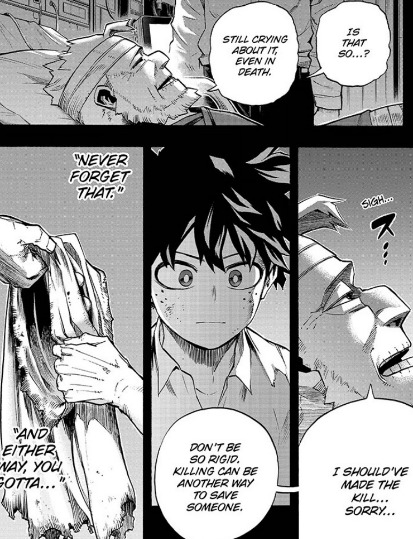
Now here’s the thing, if Deku hadn’t directly looked at the camera and told us he wanted to save Shgiaraki, would we be able to deduce his intentions from his actions? If you took away all of Deku’s internal monologue, and just showed him punching Muscular and saying nothing when Gran Torino says he may have no choice but to kill Shigaraki would anything about Deku’s actions indicate that he wants to save Shigaraki?
Let me use avatar the last airbender as a positive example for a moment. People say that Aang’s desire to spare Ozai’s life comes out of left field, but like if you analyze Aang as a character down to their bending, and the way they react in situations they always prefer de-escalation, or taking a third option as opposed to confronting things head on. It’s literally why Toph says Aang has trouble learning earth bending, because as an airbender, he always tries to look for some other way to solve the problem, instead of a direct confrontation with force. As early as season one, Aang tells Zuko someone who has tried to kill him several times that he was friends with someone from the fire nation one hundred years ago and in a different situation they could be friends.
Aang’s desire to save the Firelord may not have been told to us until the last possible minute, but Aang’s aversion to violence has always been a part of his character from the beginning. However, Deku never shows any similar aversion to violence. There’s basically no example where he ever tries to de-escalate a situation, or he avoids a conflict by seeking a third option.
Anyway, let’s move onto the next example. In the confrontation where Lady Nagant fights Deku, when Deku learns the fact that the heroes were employing government hitmen to attack people for uhh… exercising free speech does Deku give any reaction to this information?
When Lady Nagant says that Deku is only going to bring back the status quo, does he show her any meaningful evidence that he won’t do that.
Deku’s response is because the world is so grey, he needs to extend a helping hand to others. Which you know what thay could be a response. Deku saying that his response to the corruption of the hero world is that he now understands that society led some people down the wrong path, so his way of addressing the wrongs of that society is lending a helping hand to as many people as possible even people he used to think was irredeemable.
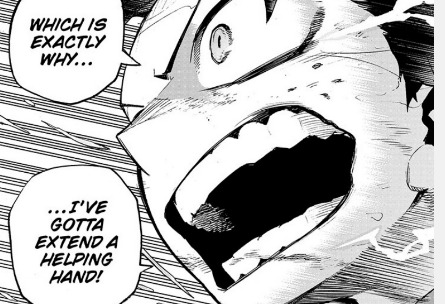
I will give Deku the benefit of the doubt, I think this is an acceptable answer. I can’t save everyone, but that’s not going to stop me from trying to save as many people as possible and maybe I can save people who were this society’s victims on the way too.
However, does Deku demonstrate his resolve to extend a helping hand in any meaningful way.
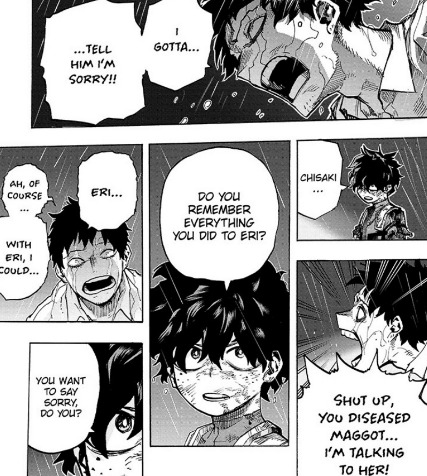
Deku is met with an armless, insane Overhaul who’s begging for someone to help heal his father figure in the Yakuza from his coma. This isn’t like Muscular who insists that there’s no helping him, Deku is met face by face with someone asking him for help. Deku’s gotta extend a helping arm whenever he can, because he knows some people were abandoned and led astray by this society…
Unless that person is someone he doesn’t like personally. At which point he only helps them on a conditional basis. We are told Deku will save anyone and everyone, but Deku is met face to face with an armless man who is begging for help and Deku’s does nothing to help him.
Deku’s not criticized for refusing to help overhaul either, it’s never brought up again.
When Deku begins to experience a mental breakdown because of all the people he’s trying to help in the Dark Deku arc, we are told this is the result of Deku trying to save everyone, but we do not see Deku attempting to save a single villain after Muscular and Nagant.
He exhausts himself beating up villains that AFO sends after him, and only helping innocent civilians. Which would be fine if this arc were about how Deku is running away from his real responsibilities the same way that Judai was running, but that’s not what we’re being told. We are told that this is all part of an arc of Deku learning to understand villains and be a hero.
Deku is asked “Can you save Shigaraki?” by the story, but Deku never at any point has to deliberate on that question. Judai doesn’t deliberate on that question either, but him choosing not to think about things and stay ignorant is the point.
It’s actually fine to make Deku stagnate as a character. It’s fine to have him take the easy way out by just punching villains and giving up on them after one conversation. It’s fine for him to be empathetic to other people’s suffering, or even self-righteous. It’s fine for him to be ignorant.
He could be all of those things if it was a part of a narrative teaching him to unlearn his behavior. In fact the narrative might have been better if Deku started out by saying he didn’t want to save Shigaraki, that there was no choice but to kill him, because then at least his actions would be consistent with his words. Then his lack of empathy and his tendency to resort to violently beating up villains instead of avoiding violence would be character flaws he could work on.
Deku however, is presented to us as this empathic hero who is always willing to give others a second chance though he never actually sticks his neck out in order to do so. Continuing on with our slow crawl through MHA, one of Deku’s friends is revealed as the traitor. Deku has a heartwarming scene fo saying that Aoyama can still be a hero, but look at his actions.
He lets the adults in the room physically tie Aoyama in a straightjacket and imprison him, for the crime of… doing bad things while he was in a hostage situation. Apparently, if a bank teller helps the bank robber by giving them money when the robber has a gun to his head, the swat team should just snipe the bank teller.
Not only does he not defend Aoyama against the adults, or stand up for him, or tell the adults they’re wrong to treat Aoyama a clear cut victim who had a gun to his head and was bing held hostage like he’s a villain - he also lets the adults use Aoyama an innocent victim as bait in order to lure out AFO. Deku tells Aoyama he can still be a hero, but he doesn’t defend Aoyama as a victim of being taken hostage, nor does he stop the adults from further taking advantage of him and throwing him right into danger. Some people are just led the wrong way that’s why they need to be extended a helping hand, but fuck Aoyama I guess. He needs to earn the right to be sympathized with by physically putting his life in danger.
Deku can’t even go out of his way to save a friend who he’s known for the better part of a year, when that friend is a complex victim forced to do bad things.
Then Deku and Uraraka have a conversation where they both, kind of ruminate on the idea that maybe the villains are human beings who are worthy of sympathy.
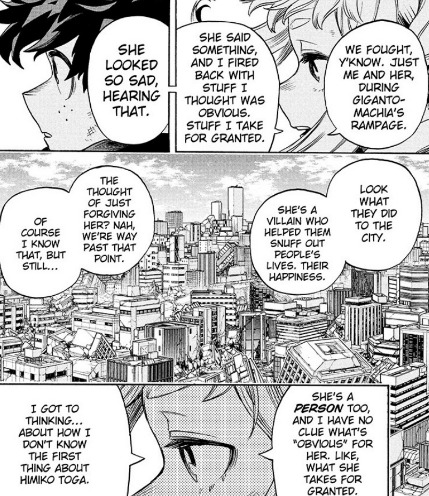
In fact Uraraka is actively trying to dehumanize Toga by looking at the destroyed city, so she won't have to think of Togaas a person.
The language here is also a major fault of this arc. It focuses far too hard on “forgiveness” over and over again. As I said before, saving Shigaraki isn’t about Shigaraki at all, it’s about Deku, and how he wants to use his power as a hero. Deku has even stated himself that he doesn’t believe that OFA is a power that should be used for killing people. So why does whether Toga or Shigaraki are forgivable or not even matter?
It’s the same with Deku refusing Overhaul any sympathy. If he’s so morally opposed to abusers, then why does he work with Endeavor and defend him at every visible opportunity, even in front of his victims?
Whether or not Deku can forgive Shigaraki doesn’t matter, because Deku is not the moral arbitrator or right and wrong. In fact Deku doesn’t even have any morals, so how is this a moral debate? Is there any point where Deku gives a clear definition of what he thinks right and wrong is? Does he quot Immanuel Kant to the audience?
Batman doesn’t kill people, not because he thinks that every last person on earth can be saved, but because Bruce Wayne an incredibly rich white man thinks that maybe he shouldn’t have the authority to decide who lives and who dies. When Bruce doesn’t kill the joker, it doesn’t mean he thinks the Jokers actions are forgivable, it’s because Bruce thinks it’s not his place to determine whether someone has the right to live.
The whole conflict that MHA presents us is that heroes pick and choose who to save, and only save the ones they deem as innocent. So, how does Deku saying repeatedly they can’t forgive Shigaraki contribute to that theme in any way?
In fact by focusing on forgiveness, rather than whether or not he personally has the right to pick and choose who lives and who dies Deku is ignoring the elephant in the room. The question isn’t about whether Shigaraki’s redeemable or if his deeds should ever be forgiven. The question is whether Deku has the right to decide who gets saved and who doesn’t.
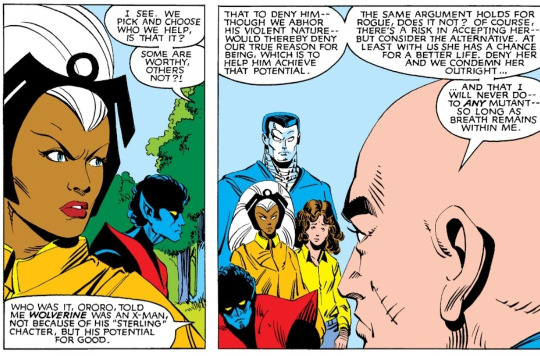
We are told that Deku as a character is someone who wants to save everyone no matter what, so Deku shouldn’t be focusing on whether or not Shigaraki is worthy of forgiveness, he should be making an idealistic argument like Xavier does in this panel. Why doesn’t Deku talk out loud with Uraraka on how he believes his power is for saving others, and not killing?
If he’s meant to represent some idealistic hero, then why doesn’t he even talk about his ideals? Why don’t I as the reader know what those ideals are?
I think Xavier’s ideals of forcing the X-men to provide a good example to the mutant community, in order to try to earn the respect of other human beings is wrong, but at least he has ideals.
He tries to inspire the other people around him to live up to those ideals. The story can criticize him for his ideals and point out how they’re wrong, while it can also uplift parts of his idelogy like where he believes there are no evil mutants. Deku has a chance to do the same to Uraraka, to tell her clearly, “I don’t think we as heroes have the right to pick and choose who we help…?” but he waffles. Not only does he waffle, but this moment is meant to be read as an indication that both Deku and Uraraka are sympathetic individuals who want to save their villains. They are supposed to look good and idealistic here and they don’t.
For Deku it just seems like a repeat of his behavior with Overhaul. The only villains that are worthy of sympathy, are the ones that he personally decides are forgivable.
The story isn’t about whether or not it’s moral to save someone who’s killed as many as Shigaraki has. The story never seriously discusses any sort of complex morality or moral philosophy. Once again to bring up avatar, yes you can argue Aang sparing the life of a war crimminal is bad, but Aang mentions on multiple occasions that he wants to retain the cultural values of the airbending people. Aang has a morality, a consistent morality, it might not be a morality you personally agree with but at least he has one.
Deku hates abusers, unless he’s next to Endeavor then he thinks abusers should be given the chance to atone. Deku doesn’t believe that One for All is a power for killing, but he never stands up to any of the adults who are blatantly trying to kill Shigaraki, he doesn’t even express out loud to Uraraka that he doesn’t think heroes have the right to decide who lives and who dies. In fact he’s given the perfect opportunity to, when Hawks kills a villain and it’s broadcast live on the news in font of everyone, but Deku never has anything to say about that.
The reason Deku and Uraraka both put such an emphasis on “forgiving” their villains has nothing to do with the story itself. It’s because the author Horikoshi, is afraid that some people will misinterpret his story as saying that he actually thinks that saving a villain like Shigaraki means that he condones mass murder, so he has to have the characters talk about not forgiving Shigaraki.
Judai doesn’t have any consistent morals either, but once again that’s the point and something the story relentlessly calls him out on.
Cobra: Fortune would never smile on a fool like you who fights while prattling on about enjoying duels.
Cobra: You are certainly a talented duelist. But you have one fatal flaw.
Judai: A fatal flaw?
Cobra: Yes, your duels are superficial. Someone who fights with nothing on his shoulders, cannot recover once he loses his enjoyment. What a duelist carries on his shoulders will become the power that supports him when he's up against the wall!
Cobra: But you have nothing like that! Those who go through life without anything like that cannot possibly seize victory.
Cobra: But I know that nothing I say will resonate with you... because you have nothing to lose but the match.
Judai: I...
Cobra: Afraid aren't you? Right now, you have nothing to support you.
Judai’s regularly called out for his superficiality. Judai is only a hero because he’s strong and wins fight, he doesn’t feel any responsibility towards other people, and in fact he loathes having to feel responsible for others. Judai isn’t just naive, he deliberately chooses to remain ignorant.
Since he’s ignorant of his own faults, he makes awful decisions when it comes time for him to lead, and his friends die because of choices he made.
We are told that Deku doesn’t want to remain ignorant, that he wants to understand villains, but Deku’s actual actions are him continuing to ignore society’s ills and the suffering of victims. In fact if you take away Deku’s internal monologue and the narration, Deku’s actions almost exactly mirror Judai’s.
Deku is just as superficial as Judai, and he also doesn't want to spend any time thinking about what kind of hero he wants to be, but the narrative never punishes him for it.
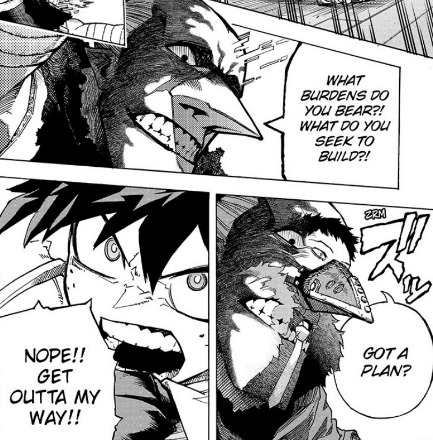
Judai is asked what burdens he has to bear and he has to meaningfull answer that question, Deku is allowed to get away with not having to think about anything. Deku remains superficial.
Both Judai and Deku spend the entire arc running away from their villain rather than confronting them in any meaningful way. They both never express out loud any sympathy for their villain, or try to empathize. THey both never step down from the role of hero, and only confront their villain as a hero, because they don’t want to think about themselves as complicit or in the wrong.
Shigaraki and Deku’s final confrontation mirrors Judai and Yubel’s but without the same clear framing. THe entire time Yubel is trying to get Judai to empathize with them, and Judai only responds with physical violence, because they don’t want to stop being the hero and because they can’t see Yubel as anything other than the villain.
As soon as Deku arrives on the battlefield (by the way everyone else and their mom pointed this out, but Deku who doesn’t think OFA is a power for killing, is completely okay with a plan called the “Sky coffin plan” where every other hero was clearly trying to murder Shigaraki).
When Deku arrives he asks if Shigaraki is still in there, but he doesn’t do anything to try to reach Shigaraki, he jumps right to punching him. In fact he never tries anything besides punching him as hard as possible.
How is punching Shigaraki with the force of a thousand suns saving him exactly?
How is that different from how he tried to defeat Shigaraki the last war arc, before he saw the image of the crying child that made him want to try a different approach in saving Shigaraki?
In Judai’s final fight with Yubel, it’s made explicitly clear that Judai is not trying to save Yubel, and that’s a fault on his part. In fact Judai gives the traditional “I have friends, and you don’t” speech to Yubel but it’s a subversion of how that speech is usually used.
Usually that speech is used to show that the protagonist won because of they valued friendship,while the villain treated their friends poorly and only cared about power. However, it’s ironic in this case because Judai got all of his friends killed. Judai treats his friends like garbage. This speech isn’t used to show that Judai is winning because he values his friends more than Yubel does, it shows that Judai is a hypocrite, playing the hero in this situation where they are just as bad as Yubel.
Judai’s not morally superior, he’s just lucky that he has good friends. Friends that were willing to save him. The only connection Yubel has to anyone else, Yubel’s only friend is Judai and Judai is a shit friend.
In fact, Mirio tries to give a version of the “You don’t have any friends” speech to Shigarkai, only for Shigaraki to get mad and tell Mirio that he does have friends and people he wants to protect.
This fact is also something that is blatantly ignored by Deku, even though Mirio tells him about it… even though we are told that Deku is trying his best to see the humanity in Shigaraki.
Judai blatantly admits they’re trying to kill Yubel. Which makes them a worse person, but a better character than Deku, because their actions are clearly framed by the narrative and consistent.
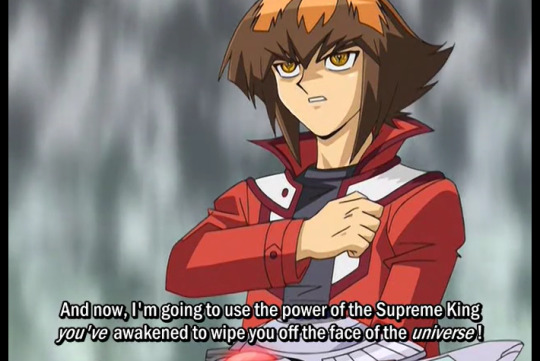
On the other hand we are told that Deku doesn’t want to kill Shigaraki, and yet everything Deku does makes it look like he’s just trying to kill Shigaraki and put him out of its misery. If we didn’t have Deku stating out loud that he wants to save Shigaraki and wants to see him as a human, there’d be nothing in his actions to indicate that he’s trying to avoid killing Shigaraki. Deku says he can’t pretend he didn’t see Shigaraki crying, but like, does he ever hesitate to punch Shigaraki, does he ever think that causing Shigaraki more harm is wrong when he’s already suffered so much?
Deku says that Shigaraki is a person but does he treat him like a person? Does he try to talk to him like a person?
To use avatar again, Aang does talk to Zuko pretty early on. Deku doesn’t even give the classic “We could have been friends under different circumstances” speech. When Shigaraki resists Deku’s attempts to see him as a person or emapthize with him, Deku’s response is to just resort to punching harder.
Which is in effect the same thing Judai does to Yubel, just kill them as a villain so they don’t hurt anybody else, but framed in an entirely different light. Judai is shown to be ruthless, and cold in his attempt to only settle the conflict with Yubel by violently putting them down. On the other hand we’re being told that Deku is compassionate and empathic while he punches Shigaraki with the force of a thousand suns.
There’s another eerie similarity between both of these final confrontations. At the climax of the confrontation, both Judai and Deku have a psychic vision where they see events from Yubel and Shigaraki’s childhood. This vision is supposed to help both characters understand the good in the villain they’re facing.
Let’s see the contents of this vision and how the visions change each character. Judai is shown a vision of his past life where Yubel sacrifices their entire body, and even their humanity to go through painful surgery to turn into an ugly dragon, all for the sake of protecting Judai in a previous life.
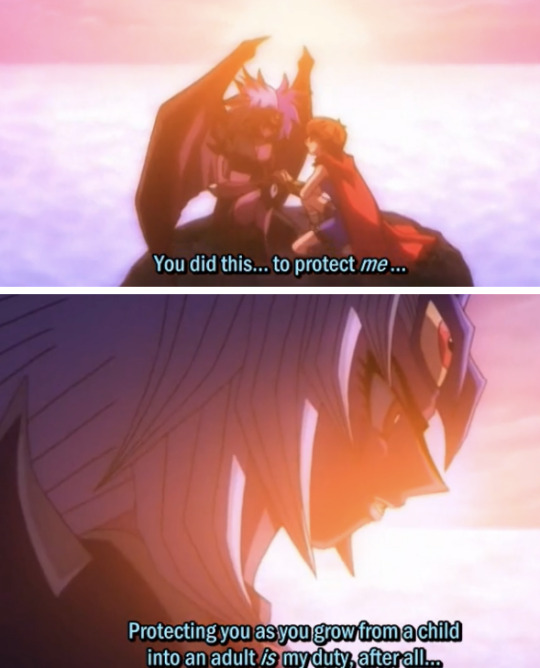
Judai is then forced to witness the good side of Yubel they’ve been ignoring all along to paint them as a villain. Yubel is simultaneously extremely selfish and willing to hurt people Judai cares about, but they’re also extremely selfless and will do anything to protect Judai and have made great sacrifices in the past for Judai’s sake.
Deku gives lip service to not ignoring the humanity in Shigaraki, but Judai is literally forced to acknowledge the humanity in Yubel. Not only that, but Judai changes his behavior immediately after learning this new information.
After seing the sacrifice that Yubel made for him in the past, Judai responds with a sacrifice of his own. A sacrifice that perfectly mirrors the sacrifice that Yubel once made for him. Yubel gave up their humanity for Judai, so Judai fuses his spirit to Yubel’s, becoming a human / spirit hybrid so Yubel no longer has to be alone.
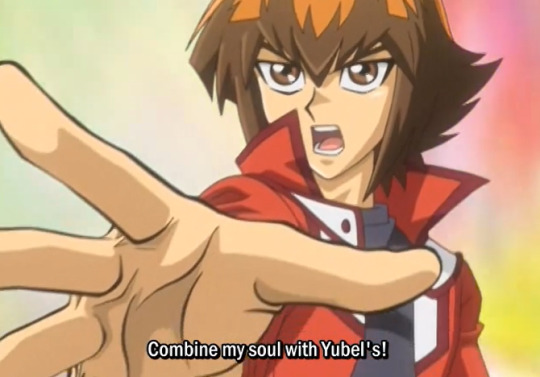
Judai also doesn’t just fuse their soul with Yubel’s in order to stop Yubel from destroying everything, it’s because both of them at this point need to atone together, and Judai is fulfilling his responsibility of watching over his friend until the end to prove that you care about them - as he said to Sho. Judai’s also fulfilling Johan’s dream of helping repair the bonds between spirits and humans, by reconciling with Yubel and repairing their bond. It’s also Judai atoning for his previous behavior of abandoning Yubel, by choosing to stay alongside them as they both atone together.
Deku does sacrifice OFA during the fight against Shigaraki, but their sacrifice isn’t to help Shigaraki, but rather doing psychic damage to Shigaraki by using OFA is the only way to defeat them. He transfers OFA in order to break Shigaraki’s brain so he’ll stop reissting and Deku can beat him down.
Judai fuses their soul together with Yubel out of empathy and a responsibility they feel to help their friend fater abandoning them, Deku transfers One for All to Shigaraki in order to hurt him and make him easier to punch. It's funny that Deku doesn't travel to Shigaraki's mind to learn more about him, but instead with the specific intent of harming him.
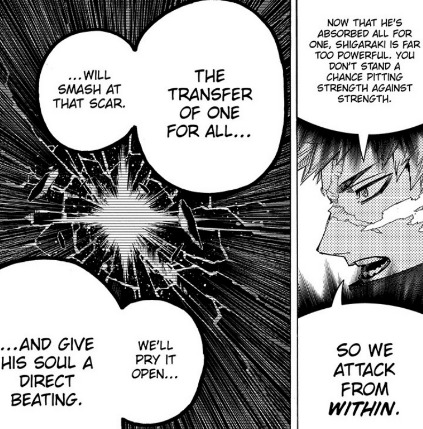
Once he's inside Shigaraki's mind, he doesn't take time to reflect on how Shigaraki used to stand up for bullied kids, or how he wants to be a hero to villains because no one else will stick up for the outcasts in society. No, he only care about Shigaraki when he takes the form of a child crying for help.
In the aftermath of the psychic vision Deku’s behavior doesn’t change towards Shigaraki in any way either. You could say he sacrificed his own arms in order to try to comfort Shigaraki within the depths of his own mind - but that’s not a real sacrifice either because his arms immediately come back.
When Judai learns about the sacrifice that Yubel made in a previous life towards him, he stops seeing Yubel as an enemy and finds a way to resolve things peacefully between them.
When Deku lanterns that Shigaraki’s a victim of All for One, and that his entire life was a lie, when he sees Shigaraki’s suffering first hand does his beavior twoards Shigaraki change in any way?
When he sees Afo has taken over Shigaraki’s body again, does he try to shout for Shigaraki, to tell Shigaraki to fight from the inside, to reassure Shigaraki that he’s still in there that there’s still good in him?
Nope. He just punches Shigaraki some more.
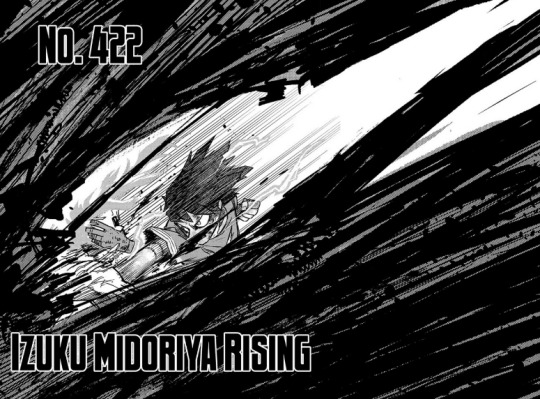
What Deku needed to tell Shigaraki is so obviously set up by the narrative too. Shigaraki wanted just one person in that house to tell him he could be a hero. Deku wanted his mother to tell him he could be a hero if he was quirkless.
Deku sees that Shigaraki started out as a boy who wanted to be a hero, and who was manipulated into being a villain but does he try to appeal to the boy inside of Shigaraki by telling him he can still be a hero? Does he now see the good in Shigaraki?
Nope, he just tries to kill him by punching him really hard.
I purposefully chose the images for the banner of this post, because it shows how differently MHA and GX treated its villains in the end. Yubel is embraced by Judai in the end, Shigaraki evaporates into dust.
"Judai, now that our souls have become one we will never be separated again. I have now been filled with your love and power. Let us fight together, against the wave of light leading this universe to destruction!"
Shigaraki could so easily have been given the love and empathy that Yubel was shown, but instead their life ends with no show of empathy from Deku, and with them dying believing that their long life of tragedy meant nothing in the end. Shigaraki realizes he's a crying kid, but he's never comforted.
Shigaraki: I only stole my body back from Master, and I didn't destroy anything. "In the end, I was just as you said... A crying kid, huh?"
Yubel is embraced and comforted, Shigaraki disintegrates into nothing.
One of these stories is apparently an optimistic story about heroes saving people, but it ends with the lifelong victim being killed in the most nihilistic manner possible, never receiving comfort, and never achieving anything with his long life.
The other story is a silly anime about card games, shows that when people are alone and suffering they can lash out and do terrible things. That all people are weak especially when they're alone, but the solution isn't to abandon them, or condemn them for their faults, but to believe in them and help uplift them the same way that Judai decides to uplift Yubel so they can atone together.
Which is why Deku gets an F in being a hero.
Go directly to summer school. Do not pass Go. Do not collect $100.
#mha meta#ygo meta#mha 423#bnha 423#mha 423 spoilers#bnha 423 spoilers#izuku midoriya#deku#shigaraki tomura#tenko shimura#judai yuki#yubel#soulshipping#yu gi oh gx#yu gi oh
682 notes
·
View notes
Text
"What A Beautiful Family!"
In which you get confused for being a family
Rengoku:
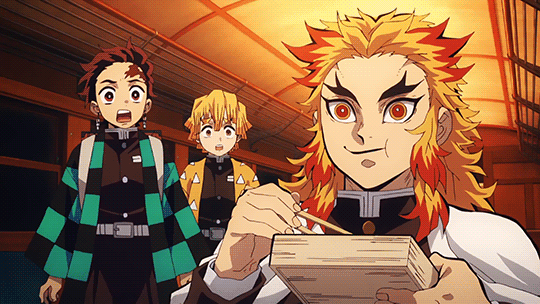
- It happens during a trip to the store in town with his little brother. Maybe it was to restock groceries or maybe it was buying supplies for his next demon conquest, either way: all three of you went down to visit.
- Rengoku smiled softly at you as he watched you with his little brother, holding his hand and laughing with Senjuro and occasionally lifting him up and spinning around.
- At some point during the walk, Senjuro pointed at some birds flying in the tree and begged Kyojuro for a closer look, which Kyojuro happily allowed him to do and put him on his shoulders with a big smile. You helped Senjuro steady himself and laughed at how precious the two looked.
- As Senjuro and Kyojuro debated about what kind of birds they were, you couldn't help but look at Kyojuro with nothing less than love in your eyes and a fond smile.
- "Aw, how precious!" a woman walking past with a basket filled with baked goods cooed at you three, "I'm glad even with demons terrorizing us, people can still have moments like this. Here, have some!"
- At first you tried to decline out of embarrassment but Kyojuro humbly took them and gave one to Kyojuro and handed a pastry to you. You were hesitant but then you took it and graciously thanked the lady, "but also, I feel bad for not paying for these, ma'am. Please, let me-"
- "Don't you worry about it. A beautiful family like you should enjoy a good snack on such a lovely day, especially since your husband's a hashira."
- Rengoku opened his mouth to let out a hearty "TASTY!" but stopped himself halfway when he heard that. You just stared at the lady in flustered shock as she bowed her head and walked away.
- You and Kyojuro shared a look with each other, Kyojuro giving you a nervous yet wide grin and you returned it. Both of your faces felt warm and you were barely able to hold eye contact with each other.
- "Haha, that lady thought you were (Y/n)'s husband! Isn't that funny, big brother?" and Rengoku's gaze softens as you become timid and look down at your feet, "Yes...I suppose it is, Kyojuro."
Tengen:
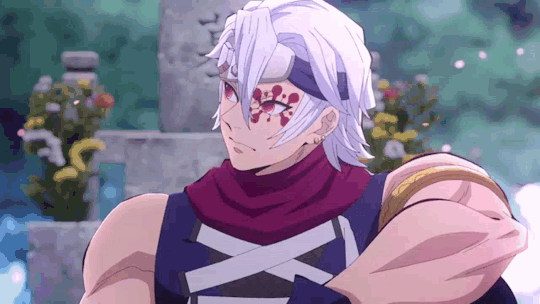
- You were walking with Tengen and his wives, happy to see him a bit more after his retirement, when you stumbled upon three neighboring children, who played too roughly and were crying their eyes out about it.
- You and Hinatsuru helped them while Suma tried not to cry with the two boys but offered to help and Makio awkwardly tried to calm them down. Tengen just squatted down and told them that it wasn't very flashy to cry, which made you and Hina elbow him.
- Instead of getting more upset, however, all three boys became excited and seemed to recgonize Tengen, asking him if he was the sound Hashira, which seemed to greatly inflate his ego as he said: "Yes but I am also the God of Festivals!"/ "WOW! REALLY!?"
- You and his wives exchanged glances knowing he wouldn't shut up. When they asked if he could tell him a story of the demons he fought, he tried to be all: "Oh, it might be too scary for you kids...BUT WHAT THE HECK- So I was in the Entertainment District which is filled with prost-"/ "UZUI."/ "IT'S IMPORTANT TO THE STORY."
- Anyways, after some censoring, each boy found a home in your lap, Suma's lap, and another sat on Hinatsuru's but leaned their head on Makio's arm. All of you entranced by Tengen's storytelling and prescence.
- "Haha, such an energetic father. Those boys are definetly gonna grow up strong!"/ "I wonder which of those women are his wife?"/ "From the way they're looking at him, all four, probably."
- Tengen's voice suddenly stopped, most likely because he heard what they said, but instead of correcting him, his eyes landed on you. You could feel Hina's, Suma's, and Makio's gaze on you as well and you felt timid...but not uncomfortable. His lips upturned into a smirk and you felt yourself trying to look at ANYWHERE but the attractive faces that were staring at you.
- "Well, what happened next!?" One of the boys demanded, impatient from the cliff hanger.
- "Huh- Oh, right! Anyways, this demon CAME OUT and he was UGLY. Absolutely hideous, like a monster that crawled from under your bed-"
- When the boys finally were called home, you all waved goodbye and parted ways. Leaving you alone with the retired Hashira and his wives, you didn't say anything but the energy felt different as Suma clung to your arm and Tengen walked closer to you, Makio's eyes would stray towards you but timidly look away when you caught her gaze as Hina wished this walk would last forever. Just the five of you.
#THIS WAS RUSHED BUT IT WAS IN MY DRAFTS FOR A WHILE.#HOPEFULLY YOU GUYS LIKE IT.#kny x reader#demon slayer x reader#demon slayer#uzui x reader#uzui wives#uzui tengen x reader#tengen uzui x reader#tengen x wives x reader#rengoku kyojuro#rengoku x reader#kyojuro rengoku x reader#kny x you
8K notes
·
View notes
Text

I will never say that I am in love (18+)
{ alternate title: you are the love of my life }
Aemond Targaryen x f!reader
When the one-eyed prince falls, the realisation comes to him in the scent of flowers. In his nephew's laughter. In his dreams.
themes/warnings : just pure sweetness, our emotionally constipated and repressed Aemond Targaryen, he thinks some *impure* thoughts in this one (how dare he!!!), he does NOT want to even think about falling in love (what a stupid distraction, he is not weak, you all should know) - also, he is DOWN BAD for the reader.
all my other works
a/n : this is the first fic I'm writing completely in the male lead's, in this case Aemond's perspective. Complete train-of-thought type of storytelling. (also, this is not in my scheduled works, the idea came to me after watching the new promo clips for s2... never in a million eons did I ever think I would hear Ewan Mitchell utter the word "cheugy" but oh well) - Enjoy! 🖤
{ I. flowers ▪︎ II. innocence ▪︎ III. dreams }

I.
Aemond decides that he finds pleasure in your scent.
The thought comes to him as he strolls through the halls of the Red Keep. Not a strong one, not a revelation by any means. A mere inkling of something he favours.
It is innocent. It is nothing.
He had spied some flowers peeking from just beneath a window. Roses, peonies, or some other, he did not bother to truly look. He glanced them out of the corner of his eye.
And he thought of you.
You smell something rather akin to those flowers - blooming and enticing and sweet.
A simple observation, rising to him now from his memory.
That is all.
Your scent reminds him of springtime in the gardens. You are pleasant, there is no doubt, but that very sweetness can only be construed as sickly if divulged in for far too long, too often.
Besides, his icy disposition does not really take well to flowers in the spring. They are more like to whittle under his boot, and shrivel from the coldness in his gaze.
You are not for him. No.
Flowers. Sweet things. The gentleness in your voice when you call him 'my prince'. Aemond scoffs at himself as he walks on.
It is no transgression to be distracted. It is a natural thing.
You are a distraction, and Aemond decides to think of you no more.

II.
Aemond comes to Helaena's chambers to visit with his niece and nephews. It is only by coincidence that you are almost always there too.
"Prince Aemond." Your voice resembles a song in greeting him. "Queen Helaena has just left to speak with Lady Alicent, but she should return shortly."
"Hmm." You are not a lady-in-waiting to Helaena, but more of a companion, a friend. Yet you do not mind looking after Jaehaerys, Jaehaera, and Maelor when their mother is indisposed.
This is where Aemond finds you, most mornings. Were it anyone else, he might have sent them away, so that he can spend time alone with the children.
But he lets you stay, because, of course, Helaena would prefer it so. She dotes on you so dearly, Aemond has noticed.
In these instances, he lets you stay only because it is what Helaena would want. Why else?
He settles on an upholstered stool and beckons to the children. They eagerly waddle their way over to their beloved uncle.
You watch the interaction with a smile, as you always do. With your legs curled underneath you, comfortably seated on the floor a few feet in front of him.
Aemond used to pay you no mind, but increasingly it has been nagging at him that you are observing, taking him in.
It is inane to be self-conscious; there is no reason to be. He is the Prince - being perceived has been a constant all his life.
He is the Prince, and you are merely a lady companion.
But when you say things like, "They are very fortunate to have you as their uncle, my prince," it makes him feel a sense of pride. Like it is some accomplishment to be complimented by you.
He knows this. He knows he is a good uncle.
Perhaps it is just that. Vanity.
You pointing it out has nothing to do with anything.
Jaehaerys crosses the many strides it takes for him to reach you again, and he pulls at your hand.
"Come," he giggles.
"Where, sweet boy?"
"Come, come here, come here," he mumbles mostly to himself, grunting when you are unmoving and his three-year old form is unable to magically transport you as he wishes.
"Okay," you laugh once, getting on your feet with your body bent to his level, and you let him pull you to where he wants.
Which is... right next to his dearest uncle Aemond.
"There." Jaehaerys claps his hands in glee, as you curl up on the floor beside Aemond's outstretched legs.
"He has a sense of humour, that one," you grin, looking up at Aemond.
Aemond sees your expression up close and you look okay. Comely. Fine. You are not bad-looking, by any means.
You are the most beautiful lady in the court.
You are fine, just fine.
Aemond would not mind seeing your face everyday; he already sees it every night in his dreams.
And it is just fine.
"Is something the matter, my prince?"
Call him that. Do it again. Or better yet, replace prince with his name. Call him 'my Aemond'.
Aemond desires nothing more than to hear it.
Because... because he is vain. Nothing more than that. It would take a high degree of devotion for someone to utter the words 'my Aemond' to him. And who would not want to be at the end of such idolatry.
Perceive him. Worship him. Consume him.
You already consume him.
Aemond stands abruptly, and you scramble to follow suit.
"Aem... Aemond," you stammer. "I mean, forgive me... my prince, what is wrong?"
Aemond looks down. Your delicate hand is gripping his arm, the sleeve of his tunic doing nothing to mask the heat of your skin.
He is of dragon, he is of fire.
But your touch burns.
The clacking of wooden toy horses ring in the background, the children lost in their imagination.
"Nothing," Aemond clears his throat, and folds his arms behind him so your hand falls. "I am alright. I must go."
The smell of sweetness lingers in his nostrils. Your sweetness. He is growing weak.
He steps away, "I bid you farewell, my lady."
"My prince."
Call him Aemond. Call him by his name, title be damned. By the gods, call him yours.
Aemond nearly rushes out of the chambers, his gait sure and his footsteps heavy.
Tonight, in his dreams, he will finally release his foolish desires and that will be the end of it.
Behind his eyes, he will touch you and taste you and watch you crumble underneath him.
And he will be your Aemond.
That will be the climax of this passing fantasy.

III.*
Aemond has stripped down to his undergarments, supine above the silk sheets of his bed. He runs a hand over his face, and he sees you.
All the better for it, he supposes, that he gets rid of it now before it ruins him further.
It is a memory, from only one moon ago, but he sees it clear as day.
You had let your hair down that day, and it flowed freely, following the gentle breeze. Nestled in what Aemond found out to be your favourite spot in the gardens, needle and thread in your dainty fingers, you tell him that you are embroidering a veil for your dear mother.
You request for him to sit with you, and Aemond obeys.
Pleasantries are exchanged, about the weather, your duties, his training. All the while Aemond watches the contour of your lips, how it stretches back to reveal your smile when he says something that could not be the farthest from amusing, but you find it amusing anyway.
He stares you down questioningly.
You blush then, turning your focus back to your work, "Apologies, but I... I admire the way you speak, my prince. As if every word is deliberate, carefully chosen. You are intelligent, and you care what you say."
"Hmm," he said then, but now...
In his mind, he lets you know just what he wants, "Have you ever been bedded, my lady?"
You look at him in shock, of course you do. Those rosy lips part, and Aemond wonders whether your lips below possess the same shade.
In his grand chambers, Aemond lets his hand drift down, down from the planes of his stomach, to his hardened cock. He licks his lips, and imagines the softness of your own. He strokes the leaking tip with his thumb. The picture continues.
"Do you not ever wonder about the deed?" Aemond asks.
"M-my prince...I do not... I - "
"You must," he sneers. "You must, as I do, and when I do, it is you who floods my very thoughts, and consumes my very being."
"I do not know what to say."
"Say you want to kiss me."
His grip tightens, drawing down and up his cock, covering it with the milky white that has leaked from his tip. He is pained, teeth pressing down on his lower lip. He imagines your hands on him, your dress undone as you watch him come undone.
"We mustn't," you look down in shame. Your legs clench together to keep in the warmth.
"Come here, my sweetness," he leads you to sit atop him, and your work clatters to the ground.
You try to look away, try to hide just how much he is affecting you.
"Kiss me," Aemond pleads.
You comply. He slips his tongue past your lips.
Faster, wetter, he gets harder and it is unbearable. His hands are not enough, he wishes to plunge his aching member right into your soaking folds. Wishes to watch beads of his sweat fall on to you as he pounds you without mercy, his cock squelching deep inside your cunny until it is sore. If only you will ache as he does. Come as he comes.
Aemond lifts you up and the two of you end up stumbling down on the grass. He does not relent. His fingers make quick work of the strings and ribbons holding you together. Your breasts come free and he latches his mouth on one, his tongue swirling against the nipple.
"Oh Aemond!" you moan, and it is a scandal. It is everything unholy. It is every dirty thought nestled in his mind.
Soon he has you bare, your skin practically glowing under daylight. You are perfect, and you are his.
"Take me," you say, practically begging. "I want you to fill me with your cock. Fill me with your seed, my dragon prince. Please."
"My sweetness," Aemond reveals himself to you, undoing his breeches and slipping out of his tunic. How could he resist?
"Do you want me?" he asks.
"Yes."
"Say it."
"I want you, my prince," you affirm, squirming under him, you hips bucking up with desire, hopelessly attempting to rub your cunny against his skin.
"My Aemond," he corrects you. "Say it."
"I want you," you say, "my Aemond."
Aemond rubs his cock faster and faster, the thick green veins in his hand and arms straining angrily under his skin. He feels you, he sees you in his mind so clear. You are his, and he is your Aemond.
He plunges his cock inside you, and you are left mewling and writhing as he quickens his assault.
He groans loudly. The lewd squelching of his cock turning sloppy, hasty, mindless. A few more strokes and he comes all over himself, hot white streaks decorating his torso. His silver hair in disarray on the pillows, like a broken halo. Beads of sweat falling from his temple. His mouth parted as he whispers your name.
He gives himself a few more tugs, emptying out. You would do him so much better. Touch him so well.
In his mind, he still sees it. Fragments of his memory bleeding through his fantasies. He does not know anymore what is real and what is not.
He cleans himself up with warm cloth afterward, feeling shame at his actions.
This is enough. Now he has released you from his being. The desire he holds so closely to his chest must have dissipated along with the lewd act he just committed.
"My Aemond," you whisper from behind him, wrapping your arms around his torso.
Enough. No more of such useless musings.
"I love you, Aemond."
I love you too.

🌸🌸🌸
* In III, reality is fully italicized, and his memories + fantasies are typed as normal.
this was meant to have more sections ( IV to VII )... maybe I'll come around to it eventually.
Let me know what you think of this sort of writing from Aemond's perspective!
To be tagged in Aemond or Daemon fics, comment on this post !
#aemond targaryen x reader#aemond targaryen fanfiction#aemond targaryen imagine#aemond targaryen#house of the dragon#hotd#ewan mitchell
703 notes
·
View notes
Text
That said, the D&D 3.5 Paladin was bad. It was badly designed, it had bad rules, and in conjunction with the other notoriously bad rule, alignment, it could cause havoc.
Now personally, I never had ANY problems with it in my tabletop games. I played paladins and loved it, and I loved it when other people played paladins, and it was great. But that's because, collectively as a group, we took ONE look at that terrible rule where the paladin's code of conduct prevents them from associating with Evil characters or "someone who consistently offends her moral code", and immediately went, "that's stupid, we ain't doing that, it would ruin the game".
We also didn't love the concept of alignment as a cosmic force, and didn't care for Usually Evil Goblins and Always Evil anything. And when a class's signature ability fully depends on whether creatures are capital E Evil, well that affects storytelling, doesn't it? But we all saw it the same way, and we were happily able to change it without any disagreements. In the end we had a Paladin… similar to 5e now that I think of it: completely ignore the Code's association clause, tailor the Code to personal stance or a specific Order, Detect only fiends and undead and the like, Smite anything you want, Fall only if you really fuck up, and never presume that just because you haven't Fallen yet everything you've ever done is justified and correct and anyone who disagrees with you is objectively wrong.
Basically, there were 2 options in 3.5. You either houseruled and/or handwaved things, and in matters of alignment interpretations erred on the side of "what makes the game go",
OR, you played with Rules As Written, and filled the forums with questions like "should the paladin fall?" (one such thread per week, conservatively), "we got into a fight over the Paladin, what to do?", "is it Evil to pick pockets? because we have a Paladin in the party", "the Assassin uses poison, shouldn't that offend my moral code?", and shit like that. Just... pointless strife, all the time. Again, never happened to me, but I was appalled to read about it, over and over and over.
People got intense with 3.5 Paladins (both pro and against) because it was BADLY DESIGNED and had BAD RULES. Its mechanics forced narrative choices on the entire table, and the only way to make it frictionless was having a party where no one wishes to explore a character's bad side ever, no one does things that aren't bad but WotC branded Evil™ in this or that splatbook, and everyone magically agrees all the time on "what is right and what is wrong" and "what is Lawful and what is Chaotic", which is simply impossible. The most subjective thing in the world (ethics!) was presented as an objective cosmic force, and how you interpreted it would determine how much damage the Paladin deals in combat, and whether the Paladin could keep associating with the party, and if the Paladin is still a Paladin. And all that in a game, let's not forget, whose basic, fundamental premise is "kill things and take their stuff". I'm sorry, this is tremendously stupid. It's the WORST design.
I know that for some people it worked as written, and good for them, but for the many many people it didn't work, well it's obvious why.
544 notes
·
View notes
Text
Yeah, but what if you're a character in a game they like to play? A pre-existing townie in a life simulator that helps them reconnect with normal life outside deployment? The one they somehow always tend to romance in every savefile, courting you through the clumsy mechanics?
Soap would absolutely spam interactions, interrupting any of the tasks you are trying to do. What do you mean your relatonship progress starts going down after he chose "tell a flirty joke" twenty times in a row? Why are you falling out of the conversation and going to water your plants or play on the computer? Does he have to delete it out of the game for you to stop getting distracted? Hmph. If you were a real person, you would be already swooning at his jokes, that he knows for sure. C'mon, bonnie, don't leave the lot for work! If you accept his proposition to move in, you'll never need to work a day in your pixel life! He also has a fuckton of savefiles, because he wants to try every single thing the game has to offer, but turns out mastering all 158 skills and 73 careers isn't that easy in one go. He still goes after you in each and every savefile. What can he say? You're just the prettiest of them all.
Gaz has the strategy nailed down. He knows your pre-set preferences and makes sure his character caters to them (good thing you seem to be generally into him, all he needs to do is add your favourite colour to his outfit, and it suits hm too!), he can calculate the shortest route to have a romantic meter above your head in one conversation. Juggling the interactions with ease, never making the mistake to bore or upset you. He knows you'll have the best family tree in that game, and he'll make it happen. Also has quite a few savefiles, but only because he enjoys the storytelling aspect and always prepares some elaborate plot, filled with drama. Takes inspiration from the hundreds of episodes of different TV shows he manages to watch, also plays with mods to add as much flavour to the game as possible.
Price tries to court you like he would a real person. Inviting your character out, putting a lot of thought into which conversation theme choose out of what game offers, bringing you gifts. Unfortunately for him, the game isn't registering his actions as actually trying to woo you... so he just takes the gloves off and fucking cheats your relationship status. His in-game self needs a pretty partner to look after the pack of three dogs, named Ghost, Gaz and Soap respectively. He's not above cheating your babies (whether your character carries them or it's the science baby option) to be triplets. Only starts new savefiles when you both grow old and pass away in the previous one, maybe because he can't bring himself to live out your kids' lives (they should be their own little virtual people and decide for themselves), or maybe because he doesn't understand that he actually can keep playing even if his character's dead.
Ghost starts with adding himself to your family and setting your relationship status as spouses. Oh, you have some in-game pathetic weird looking prick as your pre-set partner/husband? Too bad, evicted, deleted from the game, forgotten. If he is in the mood, he won't straight up delete that poor bloke, but will set up a pool with no ladder and drown him in it or lock him in a separate room to starve. Nothing you should see, though, you'll be plenty busy drowning yourself, not in a pool, but in his affection. Doesn't spam interactions, but really enjoys just watching you go about your day and making it so that his character takes care of your needs - if you start to get hungry, he's already slamming the "call to meal" button on the giant ribs plate his in-game self just roasted. Probably has one savefile where he keeps cheating any death back.
Or are you a cute tamagochi pocket friend/pet they enjoy taking care of, because having a real pet is impossible with their lifestyle? An NPC with an everyday quest of collecting produce in a chill farm simulator? A weekly boss they lose fight to as much times as they can afford to, just to see your opening cutscene replay over and over? A companion whose personal quest they have memorized line by line, but never skip dialogue to hear your voice and look at every expression you make?
Whoever you are, what if one day something in your code changes and you suddenly start recognizing them?
#call of duty#cod#soap cod#john soap mactavish#simon ghost riley#ghost cod#gaz cod#kyle gaz garrick#price cod#captain john price#ghost x reader#gaz x reader#price x reader#soap x reader#task force 141#task force 141 x reader#cod x reader#drabble#fluff#imagine#x reader
222 notes
·
View notes
Text
Some of my thoughts on maxton hall and why i loved it so much:
- im so glad that they didnt have james being a dickbag and kissing other girls after he met ruby
- the contrast of james and ruby’s families, the polar opposite in fathers. I love how they still had james and lydia be each other’s rocks in such a crappy situation when they have no one else, even if their relationship isn’t the best. The dichotomy of their relationship to ruby’s and ember’s? things can go wrong but they are sisters who love each other deeply.
-i loved the very pride and prejudice esque scenes of ruby dressing james down, and every time he deserved to be told off but it still makes ruby feel guilty afterwards. there’s a moral compass of ruby that james hated at first but it humbles him? Chefs kiss its so fucking good. He betters himself just like darcy and the change is seen even by his parents.
- the scene of ruby telling james off in the oxford course, its a pivotal scene because everything she says digs at things he knows. Young Beaufort wasnt his idea, it was Lydia’s and he’s taking credit and charge of it. He feels bad, he’s forced into it, but it’s the “you go through life representing wealth to which you have contributed absolutely nothing? With so much money, there’s no need for your own ideas.” Ruby has no idea how hard that actually hits home, and you can see Lydia take a step back mentally and yeah she agrees. The rest of it, how people will only like him for his money and not himself, that also hits so close. We see how Cyril laughs inspite of James’ pain, Alister is impressed by Ruby’s dress down but no one goes after James like a true friend would. As the series goes on you see how Alister and James grow closer as he becomes a better person, you see the care and concern because they’re in similar places but Alister isn’t as proud or arrogant as James is. I really love how by the end of the series, you have James and Alister confiding in each other.
- the scene on the lacrosse field, the way she apologizes and he is arrogant but decides to be nice because he is curious, and finds out that he does like her. She humbles him and makes him want to do better, she’s not the enemy and he kinda respects her for it. I also think, he’s never had anyone genuinely apologize to him, because he’s never had anyone wrong him but his own family. The apology, it’s a catalyst for him to let go of this resentment he has for her, in the truth she dug up in him.
- i am very happy that they have the good and the bad with ruby’s parents. The guilt that Ruby feels and the way her father is not happy that she is “wasting” her money on saving for his lift. There’s care there, but it’s hard nonetheless, those are big emotions to have years after an accident like he experienced.
- piggy backing off of that, the pivotal scene of James saving Ruby from the pool, that even though he didn’t know why she didnt come up but didnt hesitate to jump in? CHEFS KISS! The scene after of her confiding in him, him being so gentle and careful and being honest with percy, that he’s in over his head but he likes ruby, he wants to help her and has helped her. Oof just so fucking good!
- the way they keep telling each other that they should go back to never knowing each other, but every time fail because they’re meant to collide now, they MATTER to each other now
- i just really am glad they had him apologize for the shitty way his father was to her. That he was embarrassed by himself and his father. It was excruciating to have her get humiliated by his father. He’s only experienced it within his own family, but having it happen to Ruby? that changed things.
- they fucking nailed the cute scenes between them. The dancing in the victorian clothes, the chasing pigeons, the planning and setting up of the gala? Hell yeah!
- The whole fourth episode was chef’s kiss, no notes just purely good storytelling
More thoughts later but this is what i’ve got rn after rewatching the show for the third time
240 notes
·
View notes
Text
i actually think i have some sort of brain damage from chapter 403 because now ive taken my bkdk obsession to a whole new degree. like, i was insane before, but now i feel as if i should be genuinely put into an asylum.
ive gone through a full on awakening.
before this chapter i refused to believe that bkdk would become canon/hinted bc like its wishful thinking. but now? ive fallen into the fucking deep end. i am of full belief that bkdk will become canon or at least be hinted bc horikoshi is cooking something and im so glad im not the only one to see it.
there is no way that man doesnt know what hes doing. bkdks entire arc has been fucking perfect and this man just keeps BUILDING UP. like all this talk about feelings, and how bkdk have never really spoken about them to eachother before??? this is like, building up to a fucking love confession i swear, because katsuki DIED for izuku, and izuku cant control his heart when it comes to katsuki, and like… what other explaination is there? atp i consider it canon that theyre in love with each other.
and the other most likely ship that i thought was gonna be canon, izuocha, just is not feasible. its not like i dislike the ship, no hate to it at all, but making it canon would be so fucking harmful to izuku and ochakos characters and we dont talk about that enough. it would a dissapointing, flat conclusion with barely any build up and itd be the bland, predictable formula. like, ochako has already basically wrapped up her thing with izuku with that entire fight with toga. shes admitted herself that her crush on izuku was more admiration than anything of massive substance. and dont even get me started on izuku. barring some fluster and embarrassed blushing in the early seasons, this boy has NOT reciprocated AT ALL. its actually ridiculous. izuku has been focused on like, two things only: hero work, and kacchan. izuku does not show ANY romantic feeling to ochako whatsoever.
surely, surely if horikoshi were to make this canon, he’d put in a little more effort? add some more chemistry, more development, more than just ‘boy meets girl. blush and get shy. little crush. get married. the end’?
that is bad storytelling, and horikoshi is anything but a bad storyteller. this guy adds foreshadowing YEARS before the chapter. horikoshi is INSANE when it comes to character + relationship + plot development. if horikoshi throws all that out the way, and makes izuocha canon, id be extremely, extremely disappointed. not because i hate the ship, but because itd be out of nowhere, disregard practically ALL development, and be nauseatingly dissatisfying.
talking of which, for the entire day ive been thinking about the foreshadowing for bkdk.
there. is. so. fucking. much. it feels like everytime i read like a new section of the manga, their relationship is described in the most frutti tutti rainbow gay way. im sorry, shigafo, did you just say that katsuki is closer to izuku than ANYONE else? excuse me, aizawa, did you just describe them as pair, a pair that the class revolves around? dont even mention the shit that izuku and katsuki say referring to each other. i cant even choose one to add in here, but every out of context bkdk quote has like these SEVERE more-than-platonic undertones, especially when you consider their past and their development. i feel like horikoshi has been doing some fucking insane foreshadowing for something MORE.
yk, i keep on thinking about how in the double spread in 403, the words ‘the beginning’ are displayed right over bkdk, as they find each other. call me delusional, but that has to be on purpose. i also keep on thinking about izukus green and orange gloves in so many official arts, and the light in both their eyes when they see each other, and the way theyre both always observing the other, never speaking about how they feel directly.
their relationship is just so, so……. and i feel like the only next step is for them to talk. just. fucking. talk. its been hinted at for so long, and horikoshi is doing SOMETHING.
them simply being together would be the most satisfying, developed, beautiful ending.
if they arent canon, i will die. ill say it now. bkdk canon. there is too much proof. as a writer, i know for a fact that i write everything for a REASON. why would horikoshi write this, if he wasn’t going to do anything with it?
bkdk will be canon. i dont care if i sound insane, or get proved entirely wrong. i now fully believe that the last page of the manga will be bkdk at a theme park eating crepes.
thank you chapter 403 for driving me off the rails.
#i didnt mean to write a full essay type piece#this was meant to be a short post about me going bonkers#not complaining tho#bkdk canon#mha 403#bkdk#dkbk#bakudeku#dekubaku#ktdk#decchan#bnha#mha#ive got severe brainrot#horikoshi is doing something.#i did not reread this so excuse me if its just nonsense rambling
495 notes
·
View notes
Note
“there is no way in hell Alicent is going to abandon her children” why not?
Aegon’s a rapist and Aemond’s a sociopathic kinslayer, why should Alicent be forced to stay loyal to them?
I understand Rhaenyra why loves Jace, Luke and Joffrey because what’s not to love, they’re perfect. But I cannot see Alicent genuinely loving Aegon and Aemond after everything they’ve done.
It would be 100x more radical and feminist for Alicent to choose Rhaenyra, to put herself first, to stop letting men control her.
Goodness me, I hardly know where to start with this.
I don’t know how you think parental love works, nonny dearest, but it sure as hell isn’t "I won't love my children if they're not perfect people". That’s generally not how parenthood works. And Alicent loves her children. She was sold as a child bride and endured years of rape for the sake of producing those children. Raising and protecting them has been the main purpose of Alicent’s life for twenty years. How could she not love them?
In case you need proof, Alicent physically attacked Rhaenyra, arguably the big love of her life, because she was that angry (and rightfully so) about her son being maimed. Alicent went along with usurping Rhaenyra's throne, despite knowing it would lead to war and ruin what little chance she had left of mending things with Rhaenyra, because she loves her children and is desperate to keep them safe, and she believes that Rhaenyra would kill them to secure her claim to the throne. (Whether that is true is a different discussion - what matters here is that Alicent believes it.) Alicent stepped in front of a dragon to protect Aegon, for crying out loud. Aegon being a rapist clearly tarnished him in her eyes, and yet she still stepped in front of that dragon to protect him. If that doesn't tell you everything you need to know about Alicent's love for her children, I don't know what will. So I don't know that this is a case of Alicent being "forced" to stay loyal to her children, as much as it is Alicent choosing to stay loyal to the people she loves most in the world.
I would also like to point out that Rhaenyra's children are very much not perfect. Jace and Luke both participated in bullying Aemond. In case you forgot, it was Luke who literally mutilated and permanently disabled Aemond. It doesn't matter if Aemond was in the wrong for claiming Vhagar or calling the Strong boys bastards. He wasn't, but even if he was, cutting out someone's eye is not a thing that good people do. So I don't know where you got the idea that Jace and Luke are "perfect", nonny dearest, but it sure as hell wasn't from HotD.
I'm not going to argue over whether Luke maiming Aemond is more or less bad than Aegon raping Dyana or Aemond killing Luke (which is his fault, even if in this version of the story he didn't intend for it to happen). That's not the point. And please note, I am not making a single excuse for Aegon raping Dyana or Aemond killing Luke. I'm simply pointing out that it is extremely hypocritical to claim that Aemond and Aegon are unloveable because of the terrible things they do, but Jace and Luke are loveable when they both do terrible things as well.
And here's the thing. Rhaenyra clearly loves Jace and Luke anyway. Why wouldn't she? They're her kids and she loves them flaws and all. So why is it any less believable that Alicent would love Aegon and Aemond? Why are Jace and Luke loveable despite their terrible deeds, but Aegon and Aemond aren't? And if Alicent choosing Rhaenyra, whom she loves, would be a feminist storytelling choice, why would it be any less feminist for her to choose to stay with her family whom she loves just as much? Why are Alicent's choices only Feminist and Radical when they benefit Rhaenyra?
Even if it were true that Alicent abandoning her family and becoming lifetime president of the Rhaenyra Fan Club would make for a more feminist story - which, to be clear, it isn't - my first priority is not for the story to be The Most Radical And Feminist™. I want the story to be good. And I do not think that making Alicent abandon her family for Rhaenyra would make for a good story. It goes completely against Alicent's characterisation to have her abandon the family we're shown time and time again that she loves more than anything else. Not only would that be a betrayal of her character, it would undermine the narrative as a whole.
For better or worse, these two women and their relationship have been made central to this story. They are foils and they've each been made into the figurehead of their respective teams in every way, down to the marketing of the show. It would simply be bad storytelling to throw off that narrative balance by having them team up. It would completely upend the story being told. The point of making Rhaenyra and Alicent's relationship so central to the show is that despite their love for each other they were still driven apart and forced to become enemies. Having them reconcile would undermine the point that this story is a tragedy.
#alicent hightower#pro alicent hightower#rhaenicent#rhaenyra x alicent#rhaenyra targaryen#aegon ii targaryen#aemond targaryen#jacaerys velaryon#anti lucerys velaryon#house of the dragon#hotd
218 notes
·
View notes
Note
hey david! Do you have any George quotes regarding the final Vader vs Obi wan fight? Like did obi wan deliberately throw that fight and let vader kill him or did vader win the duel and obi wan did the Force ghost thing as a last resort?
Here's the quotes I could find that are relevant to the subject:
"A particular case is the confrontation between Obi-Wan and Darth Vader. You know there's something, some relationship they have to each other, 'cause they talk about meeting again ‘and now I'm going to get you’ and all this kind of stuff."

"So there's some kind of old battle going on that we don't know anything about that works amazingly well considering that all it is, is ultimately this one scene between him and Tarkin where he says, “He's here. He's come for me. And it's our destinies to meet up again. And I'm gonna handle this myself. I have to."

"This confrontation with Obi-Wan and Vader— it works just as a confrontation between the good guy and the bad guy. I mean, he’s— Obi-Wan's, at this point, the strongest good guy. He’s the one that has the most knowledge— the father figure that has taken on Luke. Then you have the bad father figure who is the evil father."

"And the subtext of this, which is that this is the culmination of a larger issue… has never really played, I think, for people. It's really just the confrontation between bad and good. Then the surprise at the end of this, is that: Vader doesn't kill him… but that he's able to join the Force, and by being one with the Force, influence things in a more powerful way than he can just being a Jedi."
- A New Hope, Commentary Track, Special Edition DVD, 2004

"When he loses Ben, [Luke] freaks out. He’s depressed and all the things that you would be. But Ben has put that idea in him that things happen naturally and there’s also this other thing that’s never explained, which is that he allowed himself to be killed. He didn’t really die. He disappeared. There’s more to this than just a death. Later on in the movie, Luke hears Ben say, “Use the Force!” It mitigates that loss a little bit, because he knows Ben’s somewhere and that something’s going on."
- The Star Wars Archives: 1977-1983, 2018
So there you have it.
In a destined confrontation between good and evil, good triumphs not by defeating evil but by ascending and growing beyond it.
So it feels to me that it's a "when in Rome" kind of decision on Obi-Wan's part, wherein he realizes he won't win this fight, and so he decides to make his end meaningful, so that he can show Luke that death is not the end of the journey... he's joining the Force.
Now, if we're talking power-scaling...
... you could argue that Ben might have put up more of a fight, had it been necessary.
George acknowledges that Ben's an old man when explaining the more dynamic fights in the Prequels... but back in the early days, he ranked him as more powerful than Vader/equal to the Emperor.

"Maybe we should set up some kind of levels of achievement. Ben can say that Luke is now a level 2 and Vader is a 4; ‘‘I was a 6 and the Emperor is a 6, and he’s on his way to becoming a 10, which will be a force so powerful in the universe that nothing can stop him. You must stop the Emperor before he achieves the level 10.’’"
- Story converence, 1977, as transcribed in The Making of The Empire Strikes Back, 2010
"[Vader] ended up losing his arms and a leg and became partly a robot. So a lot of his ability to use the Force, a lot of his powers, are curbed at this point, because, as a living form, there’s not that much of him left. So his ability to be twice as good as the Emperor disappeared, and now he’s maybe 20 percent less than the Emperor. So that isn’t what the Emperor had in mind."
- Vanity Fair, 2005
Now, the first one is an old quote from the development of Empire Strikes Back, when the story was very different; it's take it or leave it, if you ask me. Power-scaling is invented to justify storytelling, so if the story changes, it's not guaranteed the power-scale remains.
But if you're going by "everything Lucas said is canon!" rules then you could make the argument that, in terms of power...
If Ben = Emperor and Emperor > Vader then Ben > Vader.

And thus can argue that Ben might've beaten Vader if this confrontation was/turned into more of a Force-based contest than a physical one.
109 notes
·
View notes
Text
reasons u should watch 9-1-1
feast for the whump girlies in the shape of one evan buckley, who simply wants to be loved and inexplicably isn't
like he's literally unloved in a my sister's keeper never let me go kind of way and the fact that it takes 4 seasons to get there is frankly insane
somehow can sensitively dive into things like post partum depression while also doing cursed amulet storylines. that's camp, babey!!!!!
everyone in this show is so bad at their job that it will make you feel better about your own workplace performance
guy complains that it costs LA taxpayers $88k to put a woman through fire academy but then we never think about those LA taxpayers when there's a 9.0 earthquake or a tsunami or a hurricane or a volcanic fissure opening up in the middle of the city (the last one is just where i'm predicting this show is going) (this isn't really a reason but more just an example of the kind of storytelling you have to emotionally prepare yourself for)
angela bassett is in it, even if she is a cop
god cursed the fire chief with magic blood so he can't kill himself and go to his idea of heaven (constantly making dinner for the wife and kids he killed with his alcoholism) (he does get to bang angela bassett though) (you like this dude because he's played by peter krause who could put on a fucking clinic on how to tee-hee dance his way around every red flag in human history)
ghosts are real and there are multiple weird plots based on this premise with shockingly long-term effects!!!!
EVERYONE is gay, even the people who are straight
jennifer love hewitt's studio ghibli sponsored tear ducts and ability to breast beautifully downstairs
two men are full ass raising a child together and they don't know that they've been married for several years now but they've been married for several years
you have never felt real human hunger until you've known the urge to motorboat lou ferrigno jr.
161 notes
·
View notes